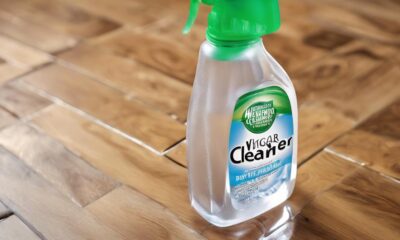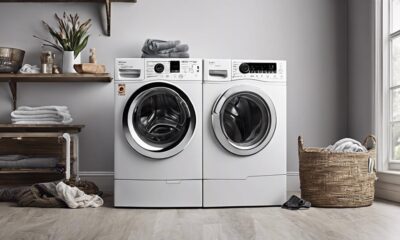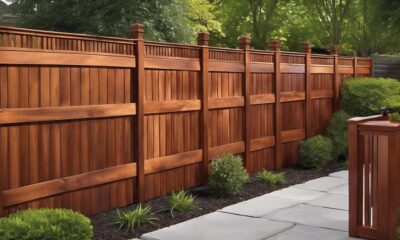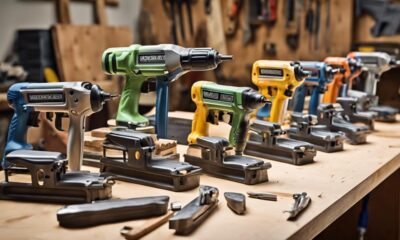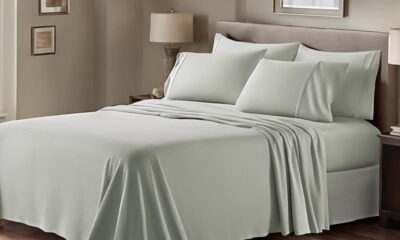Appliances
What Is Ceiling Fan Wattage
2025
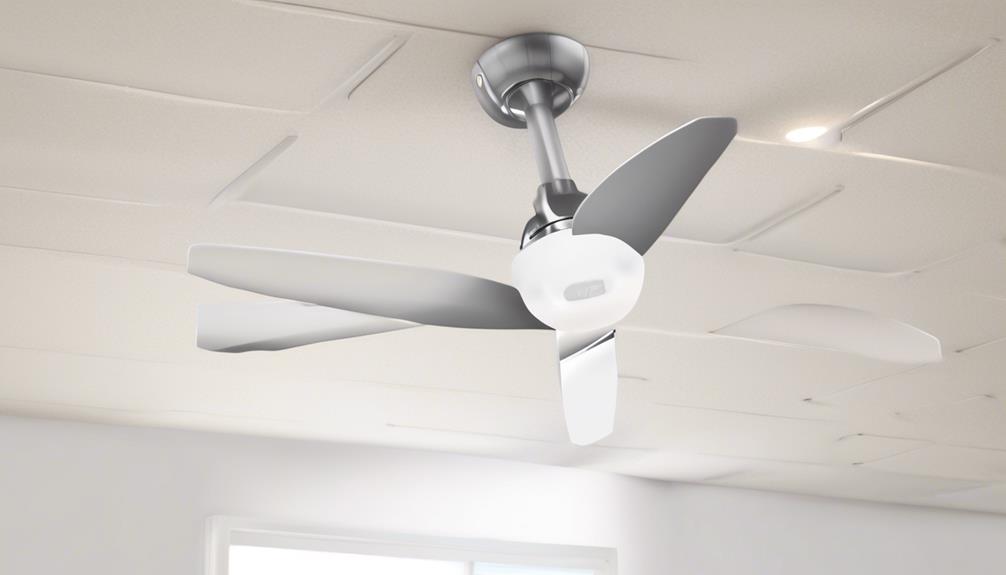
While looking for the ideal ceiling fan, we usually take into account aspects such as design, dimensions, and how quiet it is. However, have you ever paused to contemplate the energy consumption, measured in watts, of your ceiling fan?
Ceiling fan wattage refers to the amount of electricity consumed by the fan while it's in use. This can have a significant impact on your energy bills and overall energy efficiency. For example, a high wattage fan may consume more energy and result in higher electricity costs.
In this guide, we'll explore the importance of understanding ceiling fan wattage and how it can affect your comfort, energy usage, and budget. So, let's dive in and discover the world of ceiling fan wattage.
Key Takeaways
- Ceiling fan wattage refers to the amount of electricity consumed by the fan while in use.
- Higher wattage fans consume more electricity and lead to higher energy bills.
- Opting for a more energy-efficient fan with lower wattage reduces both costs and environmental impact.
- Room size and ceiling height are important factors to consider when choosing the appropriate wattage for ceiling fans.
The Basics of Ceiling Fan Wattage
When considering the basics of ceiling fan wattage, it's crucial to understand the technical specifications and power requirements of these cooling devices. Ceiling fans are an essential part of any home or office, providing comfort and energy efficiency. To maximize energy savings, it's important to choose a ceiling fan with the appropriate wattage.
Energy saving tips for ceiling fans include selecting models that meet wattage regulations. In the United States, ceiling fans must have a maximum wattage of 190 watts to comply with energy efficiency standards. This ensures that the fan operates efficiently without consuming excessive electricity. Additionally, consider the size of the room when selecting a ceiling fan. Larger rooms require higher wattage fans to effectively circulate air and maintain a comfortable temperature.
Understanding the wattage regulations and energy-saving tips for ceiling fans allows for informed decision-making when purchasing and installing these devices. By selecting a ceiling fan that meets the wattage regulations and choosing the appropriate fan size for the room, you can achieve optimal energy efficiency and comfort.
How Wattage Affects Energy Efficiency
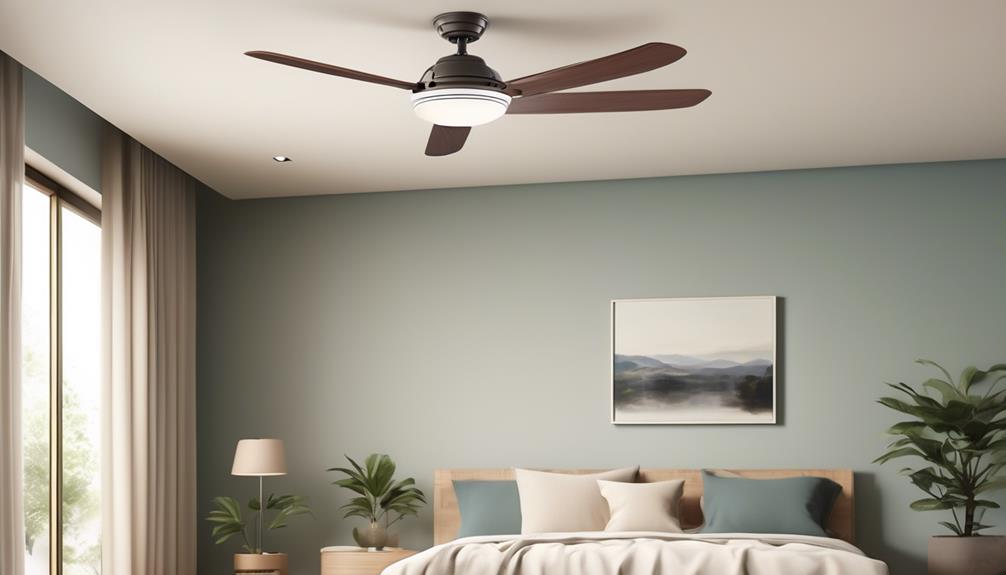
When considering the topic of how wattage affects energy efficiency, it's important to understand the correlation between wattage and efficiency.
The wattage of a ceiling fan directly impacts its energy consumption, as higher wattage fans tend to consume more electricity.
Wattage and Efficiency Correlation
To understand the correlation between wattage and efficiency, we must analyze how the amount of power consumed directly impacts the energy efficiency of a ceiling fan.
When it comes to wattage, there are two important factors to consider: its impact on electricity bills and its environmental impact.
- Wattage and electricity bills: The wattage of a ceiling fan directly affects the amount of electricity it consumes. A higher wattage fan will consume more electricity, leading to higher energy bills. It's important to choose a fan with a wattage that aligns with your energy consumption goals to minimize costs.
- Wattage and environmental impact: The wattage of a ceiling fan also has implications for the environment. A higher wattage fan not only consumes more electricity but also contributes to increased carbon emissions. By opting for a more energy-efficient fan with lower wattage, you can reduce your carbon footprint and contribute to a greener planet.
Impact on Energy Consumption
Analyzing the impact of wattage on energy consumption allows us to understand how the efficiency of a ceiling fan is affected. It is important to consider the energy consumption of ceiling fans as it directly affects our electricity bills. By comparing the wattage of ceiling fans with other appliances, we can gain a better understanding of their energy efficiency.
To illustrate this, let's consider a comparison table:
| Appliance | Wattage (W) | Energy Consumption (kWh/month) |
|---|---|---|
| Ceiling Fan | 75 | 18 |
| Air Conditioner | 1500 | 360 |
| Refrigerator | 200 | 48 |
| Television | 100 | 24 |
| Incandescent Bulb | 60 | 14 |
As we can see from the table, the wattage of a ceiling fan is significantly lower compared to air conditioners. This means that ceiling fans consume less energy, resulting in lower electricity bills. When compared to other appliances like refrigerators and televisions, ceiling fans also prove to be more energy-efficient.
Choosing the Right Wattage for Your Room Size
Determining the appropriate wattage for your room size requires careful consideration and analysis. When choosing the wattage for your ceiling fan, it's important to take into account the dimensions of your room and the level of cooling or air circulation you desire. Here are three key factors to consider:
- Room size: The size of your room plays a crucial role in determining the wattage of your ceiling fan. Larger rooms require fans with higher wattage to effectively circulate air and provide adequate cooling. On the other hand, smaller rooms can be adequately serviced by fans with lower wattage.
- Ceiling height: The height of your ceiling is another important factor to consider. Higher ceilings may require fans with higher wattage to ensure proper airflow and cooling throughout the room. Conversely, rooms with lower ceilings may not require as much wattage.
- Climate: The climate in which you live also plays a role in determining the appropriate wattage for your ceiling fan. Hotter climates may require fans with higher wattage to provide sufficient cooling, while cooler climates may allow for lower wattage options.
Understanding the Impact of High Wattage Fans
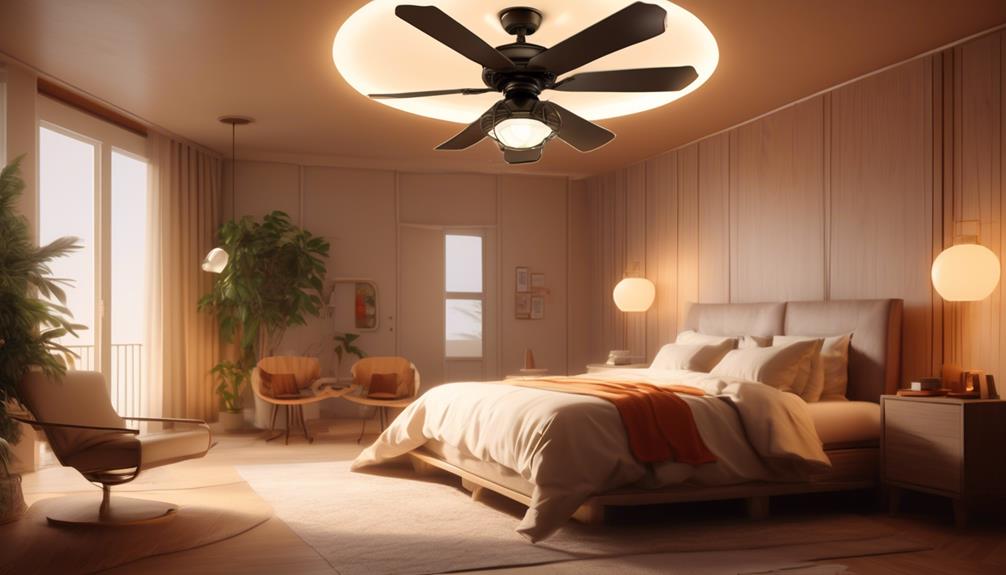
When it comes to high wattage fans, it's important to understand the energy consumption implications. These fans can consume a significant amount of electricity, resulting in higher energy bills.
However, it's also worth considering the potential cost-saving benefits of high wattage fans, as they can effectively cool larger rooms and reduce the need for air conditioning.
Energy Consumption Implications
The energy consumption implications of high wattage ceiling fans can have a significant impact on overall electricity usage. When considering the impact of high wattage fans, it's essential to understand their energy efficiency and the potential for reducing electricity consumption.
Here are some key points to consider:
- Energy Saving Tips: Opt for ceiling fans with lower wattage ratings, as they consume less electricity while providing sufficient airflow. Additionally, consider energy-efficient models that are certified by programs such as Energy Star.
- Reducing Electricity Consumption: Installing ceiling fans with variable speed settings allows you to adjust the fan's power consumption according to your needs. This flexibility can help reduce energy usage by running the fan at lower speeds when cooling requirements aren't as high.
- Utilize Efficient Lighting: Choose ceiling fans with integrated LED lights, as they're more energy-efficient than traditional incandescent bulbs. LEDs consume less electricity and have a longer lifespan, making them a cost-effective option.
Cost-Saving Considerations
To further explore the implications of high wattage ceiling fans on cost-saving measures, it is crucial to understand the financial impact they can have on overall electricity expenses. Opting for low wattage options can significantly contribute to maximizing energy savings. By choosing a fan with a lower wattage, you can reduce your energy consumption and lower your monthly electricity bill. To illustrate this point, let's take a look at the table below:
| Ceiling Fan | Wattage | Monthly Electricity Cost |
|---|---|---|
| High Wattage | 75W | $20 |
| Low Wattage | 40W | $12 |
As you can see, choosing a low wattage ceiling fan can save you $8 per month in electricity costs. Over time, these savings can add up and make a substantial difference in your overall expenses. So, when considering purchasing a ceiling fan, it is essential to prioritize low wattage options to maximize your energy savings.
Low Wattage Fans for Cost Savings
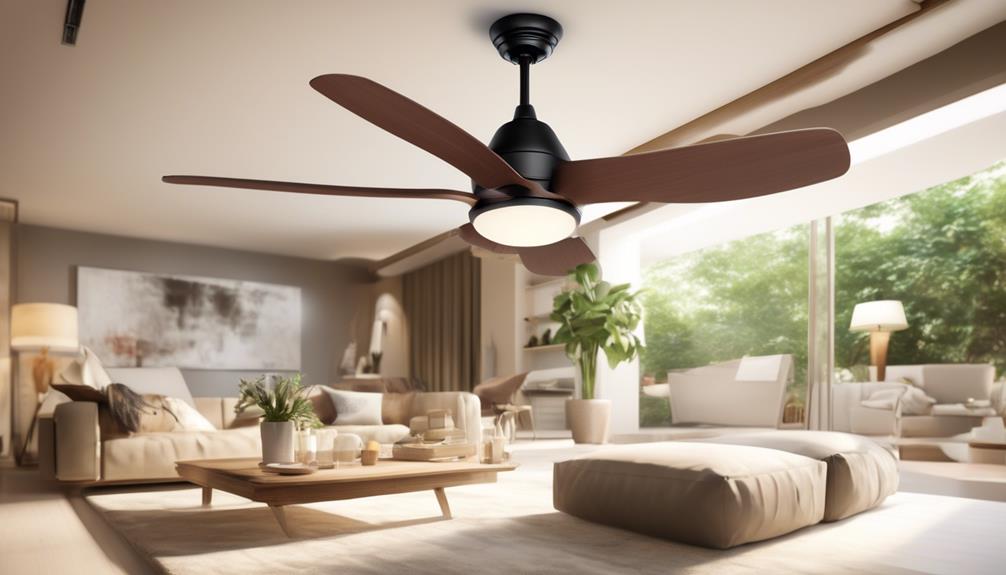
Using low wattage fans can significantly reduce energy consumption and save on costs. When comparing low wattage fans to high wattage fans, there are several key differences to consider.
- Energy efficiency: Low wattage fans are designed with energy-saving features that allow them to operate using less power. These features include efficient motor designs, aerodynamic blade shapes, and advanced control systems. By using less energy, low wattage fans can help to lower electricity bills and reduce overall energy consumption.
- Cost savings: As low wattage fans consume less energy, they can lead to substantial cost savings over time. The reduced electricity usage translates into lower monthly utility bills, making low wattage fans an economical choice for homeowners and businesses alike. Additionally, the long lifespan of these fans means fewer replacements and maintenance costs in the long run.
- Environmental impact: By opting for low wattage fans, you can contribute to a greener future. These fans produce fewer greenhouse gas emissions, helping to mitigate climate change. Furthermore, by reducing your energy consumption, you can decrease your carbon footprint and promote sustainability.
Wattage and Fan Speed Control Options
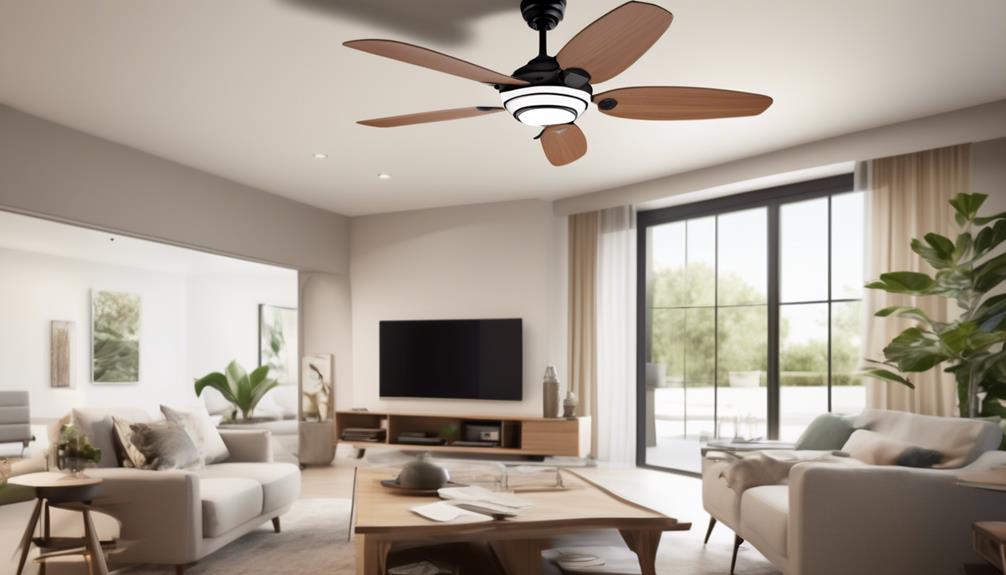
When considering wattage and fan speed control options, it's important to understand the relationship between wattage and fan motors. Different fan speeds require varying amounts of energy, and a higher wattage motor can provide more power for faster speeds.
Energy-saving speed options, such as multiple speed settings or variable speed controls, allow for greater control over the fan's energy consumption.
Wattage and Fan Motors
How does wattage affect the performance of ceiling fan motors and what options are available for controlling fan speed based on wattage?
The wattage of a ceiling fan motor directly impacts its power consumption and motor efficiency. Higher wattage motors tend to consume more power, resulting in higher energy costs. On the other hand, lower wattage motors are more energy-efficient and can help reduce electricity bills.
When it comes to controlling fan speed based on wattage, there are several options available. These include variable speed control systems, remote controls with speed settings, and wall-mounted speed controls. These options allow users to adjust the fan speed according to their preference and optimize energy consumption.
Energy-Saving Speed Options
To optimize energy consumption and control the speed of a ceiling fan, various options for wattage and fan speed control are available. Energy-saving technology has advanced significantly in recent years, allowing for more efficient operation and reduced power consumption. By utilizing these energy-saving speed options, homeowners can save on their electricity bills while still enjoying a comfortable living environment.
The table below outlines four common energy-saving speed options for ceiling fans:
| Speed Option | Wattage Range |
|---|---|
| Low | 20-30 watts |
| Medium | 30-50 watts |
| High | 50-75 watts |
| Variable | 20-75 watts |
These options provide a range of power consumption control, allowing users to adjust the fan speed according to their needs. By selecting a lower speed option, such as low or medium, the fan operates at a reduced wattage, resulting in energy savings. Conversely, the high and variable speed options provide greater airflow at the expense of increased power consumption. Understanding these energy-saving speed options empowers homeowners to make informed decisions about their ceiling fan usage and maximize energy efficiency.
Wattage and Airflow Efficiency
The wattage and fan speed control options of a ceiling fan directly impact its airflow efficiency. When considering wattage and room temperature control, it's important to understand that the wattage of a fan determines its power consumption.
A higher wattage fan will generally provide greater airflow, allowing for more efficient cooling or heating of a room. However, it's crucial to note that using a higher wattage fan may result in increased energy consumption and higher electricity bills. Therefore, it's essential to strike a balance between airflow efficiency and energy savings.
Wattage and Noise Levels: What to Consider
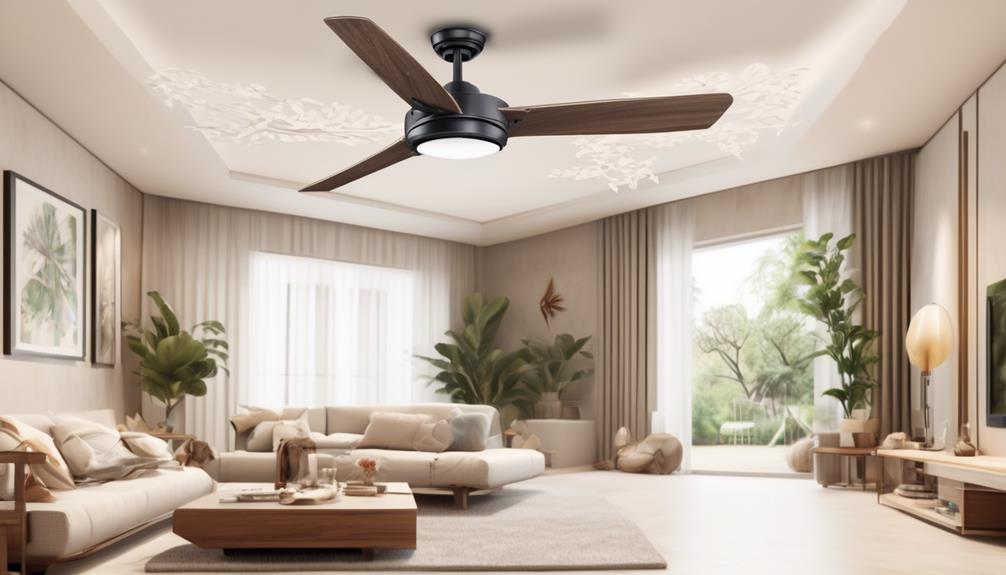
Considering the wattage and noise levels is crucial when selecting a ceiling fan. The wattage of a fan determines its power consumption, while the noise levels indicate the amount of sound it produces during operation. These factors play a significant role in determining the overall performance and user experience of a ceiling fan.
When it comes to wattage, it's important to consider the fan's durability. Higher wattage fans are often built with more robust components that can withstand extended periods of operation without wearing down. This ensures that the fan will continue to function effectively over a longer period of time, minimizing the need for repairs or replacements.
Additionally, wattage can also affect warranty coverage. Some manufacturers offer extended warranties for fans with higher wattage, as they're often considered more reliable and durable. This provides added peace of mind for consumers, knowing that their investment is protected in the event of any defects or malfunctions.
Noise levels, on the other hand, are a crucial consideration for those who desire a quiet environment. Ceiling fans with lower noise levels are ideal for bedrooms, living rooms, or any space where peace and tranquility are valued. Additionally, fans with quieter operation can also contribute to a more pleasant and comfortable living environment.
Wattage and Design: Finding the Perfect Balance
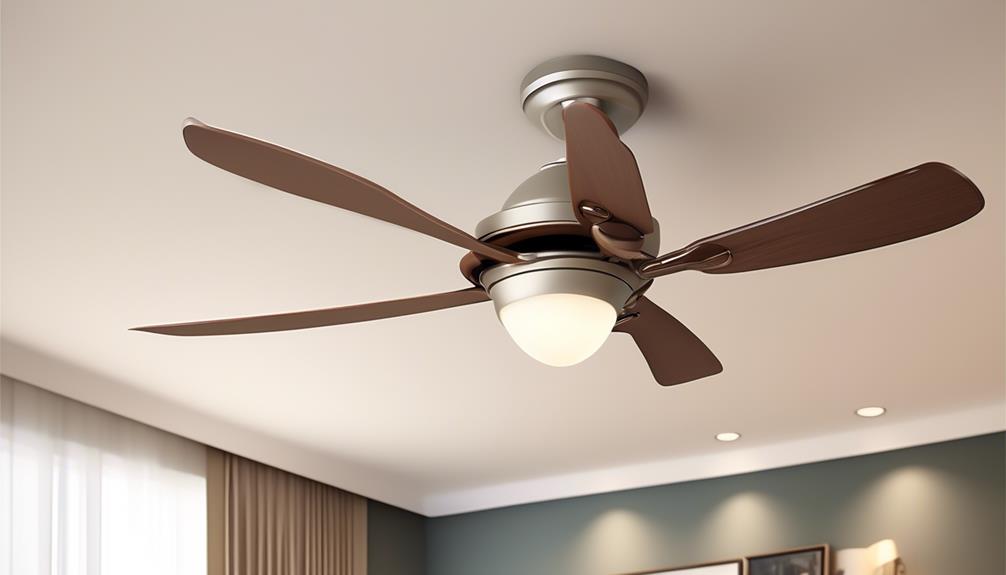
When finding the perfect balance between wattage and design in a ceiling fan, it's essential to carefully consider the power consumption and aesthetic elements of the fan. Wattage limitations and design compatibility play crucial roles in ensuring that the fan not only complements the overall look of the room but also operates efficiently.
To achieve the ideal balance between wattage and design, consider the following factors:
- Energy Efficiency: Look for ceiling fans that are Energy Star certified. These fans are designed to consume less power while providing optimal airflow. By choosing an energy-efficient fan, you can significantly reduce your electricity consumption without compromising on performance.
- Aesthetics: Pay attention to the design and finish of the fan. It should blend seamlessly with the room's decor and enhance its overall aesthetic appeal. Whether you prefer a sleek modern look or a more traditional style, select a fan that complements the room's design elements.
- Size and Placement: Consider the size of the room and the height of the ceiling when selecting a fan. A fan that's too small may not effectively circulate air, while a fan that's too large can overpower a small space. Additionally, ensure that the fan is placed in an optimal location to maximize airflow and efficiency.
Wattage and the Importance of Proper Installation
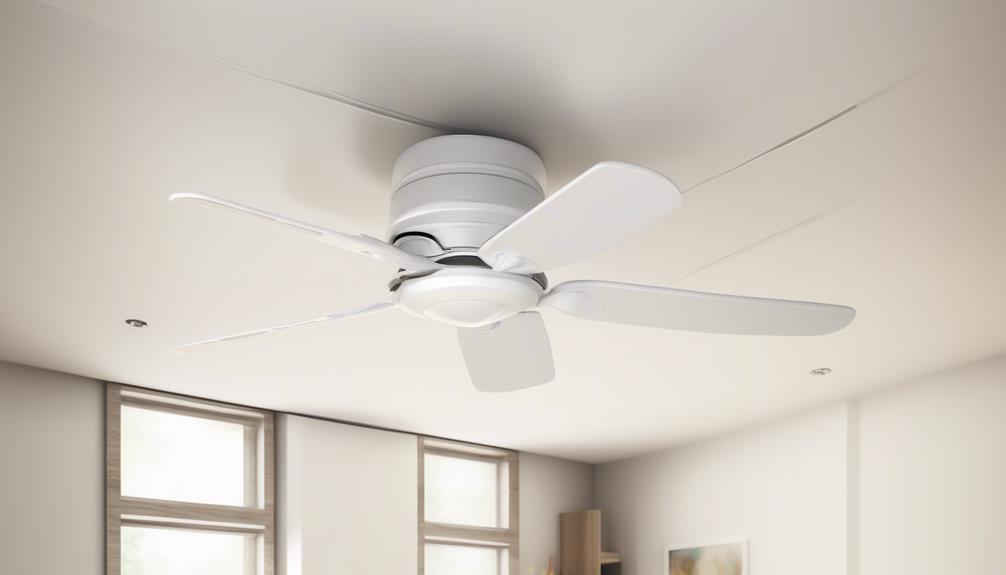
Proper installation of a ceiling fan is crucial for ensuring the appropriate wattage usage and optimal performance. When it comes to ceiling fan wattage, it's important to calculate the proper wattage for the fan to operate efficiently. The wattage of a ceiling fan is determined by the power consumption of its motor and the energy it requires to function effectively.
To calculate the proper wattage for a ceiling fan, you need to consider both the motor's power rating and the type of bulbs used in the fan. The motor's power rating is usually indicated on the fan's packaging or in the manufacturer's specifications. This information will help you determine the maximum wattage the fan can handle.
Using bulbs with wattage higher than what the fan can handle can lead to various issues. Firstly, it can overload the fan's motor, causing it to overheat and potentially burn out. Secondly, it can result in the fan not operating at its optimal speed, reducing its performance. Lastly, using improper wattage can also increase the risk of electrical issues and potential fire hazards.
Maintaining and Monitoring Ceiling Fan Wattage
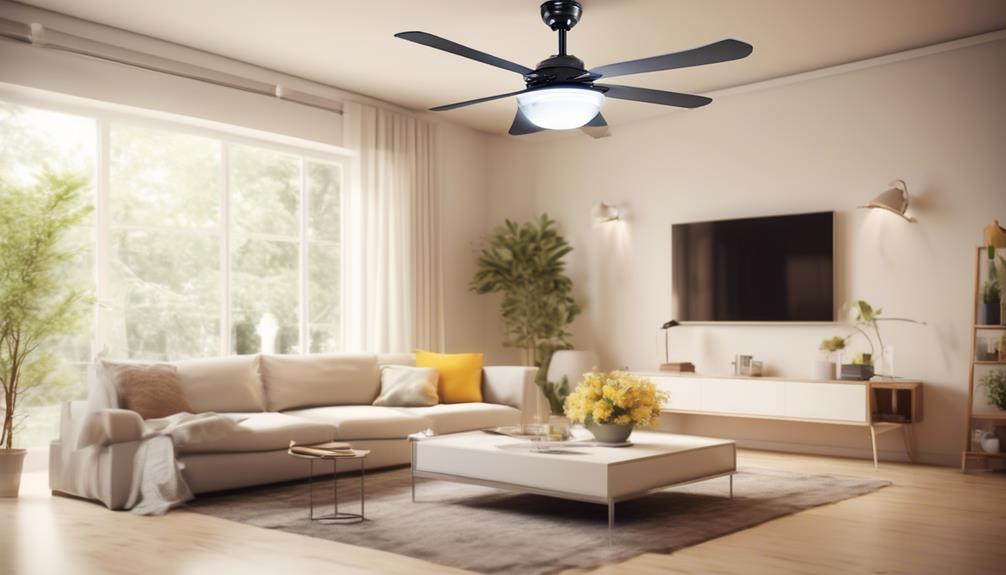
To ensure the optimal performance and efficiency of a ceiling fan, it's essential to maintain and monitor its wattage usage. By maintaining wattage levels and monitoring power usage, you can ensure that your ceiling fan operates at its maximum potential while conserving energy.
Here are three key steps to help you in maintaining and monitoring your ceiling fan's wattage:
- Regularly clean and dust your ceiling fan: Dust and debris can accumulate on the fan blades and motor, causing the fan to work harder and consume more energy. By cleaning your fan regularly, you can ensure that it operates smoothly and efficiently, reducing its wattage usage.
- Check for loose or damaged components: Loose or damaged components, such as loose screws or worn-out bearings, can lead to increased friction and inefficiency in the fan's operation. Regularly inspect and tighten any loose components and replace any damaged parts to maintain optimal performance and wattage levels.
- Use a wattage meter: A wattage meter is a handy device that allows you to measure the power consumption of your ceiling fan. By periodically monitoring the wattage usage, you can identify any sudden spikes or changes in power consumption, indicating potential issues that need to be addressed.
Is the Wattage of a Ceiling Fan Higher Than That of a Table Fan?
When comparing ceiling fan vs table fan power, the wattage of a ceiling fan is generally higher than that of a table fan. This is because ceiling fans are designed to circulate air in larger spaces and typically have more powerful motors to accommodate for their larger size and increased airflow capacity.
Frequently Asked Questions
Can I Use a Higher Wattage Fan in a Smaller Room?
Using a higher wattage fan in a smaller room may not be the most efficient choice. Higher wattage fans consume more electricity, leading to higher energy costs.
On the other hand, low wattage fans offer advantages such as energy savings and cost efficiency.
It's recommended to choose a fan with an appropriate wattage for the room size to ensure optimal performance and energy usage.
How Does Wattage Affect the Lifespan of a Ceiling Fan?
Choosing the right wattage for a ceiling fan is crucial as it directly impacts energy consumption and electricity bills. Understanding how wattage affects the lifespan of a ceiling fan is essential for optimal performance.
Higher wattage fans may consume more electricity, leading to increased energy costs. On the other hand, lower wattage fans may not provide sufficient airflow. Therefore, balancing wattage with energy efficiency is vital to maximize the lifespan of a ceiling fan.
What Are the Energy-Saving Benefits of Low Wattage Fans?
Energy efficient options can provide significant cost savings for homeowners.
Low wattage fans, in particular, offer several energy-saving benefits. By consuming less electricity, these fans reduce the overall energy usage in a household, resulting in lower utility bills.
Additionally, low wattage fans generate less heat, which can alleviate the burden on air conditioning systems.
With their advanced technology and efficient design, low wattage fans are an excellent choice for those seeking to maximize energy savings.
Are There Any Safety Concerns With High Wattage Ceiling Fans?
When considering high wattage ceiling fan installation, it's crucial to address potential fire hazards. These fans draw more power, increasing the risk of overheating and electrical malfunctions. This can lead to short circuits or sparks, potentially igniting nearby combustible materials.
To mitigate these safety concerns, it's essential to ensure proper electrical wiring and installation by a qualified electrician. Regular maintenance and inspections are also necessary to identify any issues and prevent accidents.
Safety should always be a top priority when dealing with high wattage ceiling fans.
Can I Install a Ceiling Fan With High Wattage in a Bathroom or Outdoor Area?
When considering installing high wattage ceiling fans in commercial spaces, it's important to assess the impact of wattage on the speed and performance of the fan. High wattage fans can provide increased airflow and cooling capacity.
In the case of a bathroom or outdoor area, it's crucial to ensure that the fan is specifically designed and rated for such environments. This is important because these areas are often exposed to moisture and other harsh conditions, which can affect the performance and durability of the fan.
However, it's vital to follow safety guidelines and consult with a professional to ensure proper installation and usage. This is because high wattage fans require proper wiring and electrical considerations to ensure safe operation. A professional can also provide guidance on selecting the right fan for your specific needs and help ensure that it is installed correctly.
Taking these factors into account will help you choose and install high wattage ceiling fans that are both effective and safe for use in commercial spaces.
Conclusion
In conclusion, understanding the wattage of a ceiling fan is crucial for optimizing energy efficiency and comfort in your space.
It's important to choose the right wattage for your room size to ensure proper airflow and temperature control.
Additionally, considering factors such as noise levels and design can enhance your overall fan experience.
Remember to install and maintain your ceiling fan properly to maximize its wattage and enjoy its benefits for years to come.
- About the Author
- Latest Posts
Introducing Ron, the home decor aficionado at ByRetreat, whose passion for creating beautiful and inviting spaces is at the heart of his work. With his deep knowledge of home decor and his innate sense of style, Ron brings a wealth of expertise and a keen eye for detail to the ByRetreat team.
Ron’s love for home decor goes beyond aesthetics; he understands that our surroundings play a significant role in our overall well-being and productivity. With this in mind, Ron is dedicated to transforming remote workspaces into havens of comfort, functionality, and beauty.

Are you exhausted from trying to find room for all your small appliances? Your search ends here – we have the ideal solution for you!
In this article, we will explore 12 clever storage solutions that will help you maximize the space in your kitchen or any other area with compact appliances. From wall-mounted appliance shelves to under cabinet racks, pull-out drawers, and over-the-door organizers, we have got you covered.
These innovative storage solutions are designed to keep your appliances neatly organized and easily accessible, allowing you to make the most of your limited space.
So, let’s dive in and discover the secrets to efficient storage for your compact appliances.
Key Takeaways
- Wall-mounted storage solutions, such as shelves and magnetic storage, are effective for compact appliances.
- Under cabinet storage solutions, like appliance racks, maximize space and keep appliances easily accessible.
- Pull-out storage solutions, such as appliance drawers, provide a convenient way to store and access compact appliances.
- Over-the-door storage solutions, such as appliance organizers, offer additional storage space for compact appliances.
Wall-Mounted Appliance Shelves
We love using wall-mounted appliance shelves to maximize storage space and keep our compact appliances easily accessible. These space-saving cabinet designs are a game-changer for those of us who want to make the most out of our small kitchen areas. By utilizing the vertical wall space, we can free up valuable counter space and keep our appliances within arm’s reach.
Wall-mounted appliance shelves are perfect for storing commonly used appliances such as microwaves, blenders, and toasters. They’re designed to securely hold these appliances while still allowing easy access for everyday use. With adjustable shelves and hooks, we can customize the storage area to fit our specific needs.
Not only do wall-mounted appliance shelves help us keep our countertops clutter-free, but they also add a sleek and modern look to our kitchen. They blend seamlessly with our existing cabinetry and create a clean and organized appearance.
In conclusion, wall-mounted appliance shelves are a practical and efficient solution for maximizing storage space in our small kitchens. They provide a designated area for our compact appliances, allowing us to access them easily while keeping our countertops clear.
Now, let’s move on to the next section and explore the benefits of under cabinet appliance racks.
Under Cabinet Appliance Racks
To further optimize storage space and maintain accessibility, another ingenious solution for compact appliances is the utilization of under cabinet appliance racks. These racks provide a hidden and efficient way to store your appliances, keeping them easily accessible while freeing up valuable counter space.
Here are three reasons why under cabinet appliance racks are a must-have for any kitchen:
- Maximizing Space: With limited counter space, it’s important to make the most of every square inch. Under cabinet appliance racks allow you to store your appliances out of sight, freeing up valuable countertop real estate for meal preparation or other kitchen activities.
- Easy Accessibility: Tired of rummaging through cabinets or cluttered countertops to find the appliance you need? Under cabinet racks keep your appliances organized and easily accessible. With a simple pull or slide, you can retrieve the appliance you need without any hassle.
- Hidden Storage: Under counter appliance storage provides a sleek and clutter-free look to your kitchen. By concealing your appliances behind cabinet doors, you create a clean and streamlined appearance, adding to the overall aesthetics of your space.
With under cabinet appliance racks, you can efficiently store your appliances while keeping them hidden from view. But, if you’re looking for even more convenience and accessibility, let’s explore the next section on pull-out appliance drawers.
Pull-Out Appliance Drawers
Once installed, pull-out appliance drawers offer a convenient and space-saving solution for storing compact appliances in the kitchen. These drawers are designed to be easily accessible, allowing you to effortlessly retrieve and store your appliances without the need for heavy lifting or reaching into deep cabinets.
To give you an idea of the options available, here is a comparison table showcasing some popular pull-out appliance drawers and their features:
| Drawer Model | Mounting Type | Dimensions (in inches) |
|---|---|---|
| Drawer A | Wall mounted | 24 x 15 x 18 |
| Drawer B | Wall mounted | 30 x 15 x 18 |
| Drawer C | Wall mounted | 36 x 15 x 18 |
These drawers can be easily installed on the wall, taking up minimal space and leaving your countertops clutter-free. They come in various sizes to accommodate different appliances and can be customized to suit your specific needs.
Over-The-Door Appliance Organizers
An over-the-door appliance organizer is a convenient storage solution for compact appliances. Here are three reasons why you should consider using one:
- Maximize Space: The over-the-door design allows you to utilize the often overlooked space behind your pantry or cabinet doors. By utilizing vertical storage solutions, you can free up valuable countertop or cabinet space for other items.
- Easy Access: With an over-the-door appliance organizer, you can keep your compact appliances within reach while maintaining a clutter-free countertop. No more digging through cabinets or rearranging items to find what you need. Everything is easily visible and accessible.
- Versatile Storage: These organizers aren’t limited to just kitchen appliances. You can also use them to store cleaning supplies, toiletries, or other small items. The adjustable shelves and pockets make it easy to customize the storage space according to your needs.
By incorporating an over-the-door appliance organizer into your kitchen or pantry, you can make the most of your available space while keeping your compact appliances easily accessible.
Now let’s explore another space-saving solution for storing appliances: magnetic appliance storage solutions.
Magnetic Appliance Storage Solutions
Now, let’s explore how magnetic appliance storage solutions can provide an innovative way to store compact appliances.
Magnetic appliance hooks are small, yet powerful, magnets that can hold various compact appliances securely to the side of your refrigerator or any other magnetic surface. These hooks are versatile and can support the weight of appliances such as toasters, blenders, or even coffee makers. By utilizing the vertical space on your refrigerator, you can free up valuable countertop or cabinet space.

Innovative appliance holders are specifically designed to store and organize compact appliances. These holders come in various forms, including wall-mounted racks or shelves, and are often made of sturdy materials like stainless steel or plastic. They provide a convenient and stylish solution for keeping your appliances neatly stored while still within reach.
Both magnetic appliance hooks and innovative appliance holders offer a practical and efficient storage solution for compact appliances. They allow you to declutter your kitchen countertops, maximize your storage space, and keep your appliances easily accessible whenever you need them.
With these storage solutions, you can create a functional and organized kitchen that promotes efficiency and mastery in your culinary pursuits.
Stackable Appliance Containers
We frequently use stackable appliance containers to efficiently store and organize compact appliances in our kitchen. These containers are designed to maximize space and keep our appliances easily accessible.
Here are three reasons why stackable appliance containers are a great addition to any kitchen:
- Space-saving cabinet designs: Stackable appliance containers are specifically designed to fit neatly into cabinets or on countertops, making the most of limited space in our kitchen. With their slim profiles and stacking capabilities, these containers allow us to organize and store our appliances without cluttering our countertops or taking up valuable cabinet space.
- Easy access and visibility: Stackable appliance containers often feature transparent lids or clear sides, allowing us to easily see the contents inside without having to open each container. This makes it simple to locate the appliance we need, saving us time and frustration when cooking or baking.
- Versatility and adaptability: Stackable appliance containers come in a variety of sizes and shapes, ensuring that we can find the perfect container to fit each appliance. From small containers for handheld mixers to larger ones for blenders or food processors, these containers can accommodate appliances of all sizes. Additionally, their stackable design allows us to customize the arrangement based on our specific needs and available space.
Corner Appliance Storage Units
As we explore clever storage solutions for compact appliances, one option that stands out is utilizing corner appliance storage units. These innovative space-saving solutions are perfect for maximizing the storage potential in your kitchen or any other area where you have limited space.
Corner appliance storage units are designed to fit into the corners of your cabinets or countertops, making use of the often-unused space in these areas. These units typically feature shelves or compartments that can hold appliances such as blenders, toasters, or coffee makers. The shelves are adjustable, allowing you to customize the unit to fit your appliances and maximize storage efficiency. Some units even come with built-in power outlets, making it easier to keep your appliances plugged in and ready to use.
With corner appliance storage units, you can keep your countertop clutter-free and organized. By storing your appliances in these units, you can free up valuable counter space for meal preparation and other activities. You can also easily access your appliances when you need them, as they’ll be conveniently stored in one place.

Appliance Storage Carts
Moving on to the next storage solution, let’s explore the convenience of appliance storage carts. These portable solutions offer multi-functional designs that can greatly enhance the organization and usability of your compact appliances.
Here are three reasons why appliance storage carts are a must-have for any home:
- Versatile Storage Options: Appliance storage carts come with various compartments and shelves, allowing you to store not only your appliances but also their accessories and additional kitchen tools. With designated spaces for each item, you can easily locate and access everything you need while cooking or baking.
- Easy Mobility: One of the key advantages of appliance storage carts is their portability. Equipped with wheels, these carts can be effortlessly moved around your kitchen, enabling you to position your appliances wherever they’re most convenient. Whether you need to create extra counter space or bring your appliances closer to the power source, these carts make it a breeze.
- Multi-Purpose Use: Appliance storage carts aren’t limited to just storing appliances. They can also serve as an additional work surface or a serving station during parties and gatherings. By utilizing their multi-functional capabilities, you can maximize the functionality of your kitchen space.
Appliance storage carts offer a practical and efficient solution for organizing and utilizing your compact appliances. With their portable nature and multi-functional designs, these carts can transform the way you work in your kitchen, making every cooking experience a breeze.
Slim-Profile Appliance Cabinets
When it comes to maximizing small kitchen spaces, slim-profile appliance cabinets are a game-changer.
These space-saving cabinet designs offer efficient organization solutions that help keep your kitchen clutter-free.
With slim-profile appliance cabinets, you can make the most of your available space while still having all your appliances easily accessible.
Space-Saving Cabinet Designs
To maximize space in your kitchen, we recommend incorporating space-saving cabinet designs, specifically slim-profile appliance cabinets. These innovative storage solutions are perfect for compact kitchens where every inch counts. Here are three reasons why you should consider slim-profile appliance cabinets:
- Optimal Use of Vertical Space: Slim-profile cabinets are designed to make the most of your kitchen’s vertical space. They’re taller and narrower than traditional cabinets, allowing you to store more items without taking up valuable floor space.
- Customizable Storage Options: These cabinets come with adjustable shelves and dividers, making it easy to create a storage system that fits your needs. Whether you need space for spices, canned goods, or baking supplies, slim-profile cabinets can be customized to accommodate your pantry items.
- Streamlined Aesthetic: Slim-profile appliance cabinets have a sleek and modern look that adds a touch of sophistication to your kitchen. They create a clean and organized appearance, giving your kitchen a polished and professional feel.
Efficient Organization Solutions
In addition to their space-saving design, slim-profile appliance cabinets also offer efficient organization solutions for compact kitchens. These cabinets are specifically designed to maximize storage space and keep everything organized and easily accessible. With their narrow profile, they can fit into tight spaces and make the most out of every inch of your kitchen.
One of the key features of slim-profile appliance cabinets is their efficient storage solutions. They often come with built-in shelves, drawers, and compartments that allow you to neatly store your appliances, utensils, and other kitchen essentials. These cabinets can also include adjustable shelving, allowing you to customize the storage space according to your needs.
Furthermore, these cabinets offer space-saving organization. They can be installed in strategic locations, such as next to the refrigerator or oven, making it convenient to access your appliances while cooking. Additionally, their sleek design adds a stylish touch to your kitchen while optimizing functionality.
Maximizing Small Kitchen Spaces
One key way to maximize small kitchen spaces is by utilizing slim-profile appliance cabinets. These cabinets are designed to fit seamlessly into compact kitchens, providing storage solutions that optimize both functionality and space.
Here are three creative ways to make the most of your small kitchen:
- Utilize vertical space: Install slim-profile appliance cabinets that extend from floor to ceiling. This allows you to maximize storage space without sacrificing valuable square footage.
- Incorporate creative shelving ideas: Opt for adjustable shelves or pull-out shelves to customize your cabinet space. This allows you to efficiently store and access items of various sizes, making the most of every inch.
- Opt for multi-functional cabinets: Choose slim-profile appliance cabinets that serve multiple purposes. For example, you can find cabinets with built-in spice racks or pull-out cutting boards, maximizing functionality while minimizing clutter.
By implementing these strategies, you can create a compact kitchen that feels spacious and organized.
Now, let’s explore another clever storage solution: appliance storage baskets.
Appliance Storage Baskets
We use appliance storage baskets to keep our compact appliances organized and easily accessible. These baskets are a practical solution for storing appliances such as toasters, blenders, and coffee makers. Appliance storage bins come in various sizes and designs, allowing us to choose the one that best fits our kitchen space and aesthetic preferences. These bins are typically made of durable materials such as plastic or metal, ensuring that they can withstand the weight and frequent use of our appliances.
Countertop appliance caddies are another option for organizing our compact appliances. These caddies have compartments and shelves that can hold multiple appliances, making it easy to keep everything in one place. They’re also designed to provide easy access to our appliances, allowing us to quickly grab what we need without having to search through cabinets or cluttered countertops.

Appliance Storage Hooks
Appliance storage hooks provide efficient hanging options for compact appliances, allowing us to maximize space in our kitchens.
These space-saving hooks offer practical storage solutions, keeping our appliances easily accessible while freeing up valuable countertop or cabinet space.
With appliance storage hooks, we can keep our kitchen organized and clutter-free, making our cooking and meal preparation experience more efficient and enjoyable.
Efficient Hanging Options
There are several efficient hanging options available for storing compact appliances, including appliance storage hooks. These space-saving hanging solutions offer innovative appliance storage ideas that can help maximize the use of your limited kitchen space.
Here are three options to consider:
- Magnetic hooks: These hooks can be attached to the side of your refrigerator or any other magnetic surface, allowing you to hang small appliances such as can openers or measuring spoons within easy reach.
- Over-the-door hooks: These hooks can be placed over the top of your cabinet doors, providing a convenient spot to hang lightweight appliances like hand mixers or small blenders. This keeps them off the countertop and frees up valuable workspace.
- Wall-mounted hooks: By attaching hooks to your kitchen walls, you can hang larger appliances like slow cookers or toaster ovens. This not only keeps them organized but also ensures they’re easily accessible whenever you need them.
With these efficient hanging options, you can make the most of your compact kitchen and keep your appliances neatly stored and within arm’s reach.
Space-Saving Appliance Hooks
To make the most of your compact kitchen and keep your appliances neatly stored, consider using space-saving appliance hooks. These innovative hooks provide efficient hanging options for your appliances, helping you save valuable counter and cabinet space.
With appliance hooks, you can easily hang your blender, toaster, or even your coffee maker, keeping them within reach while freeing up your countertops. These hooks are designed to securely hold your appliances in place, ensuring they stay stable and safe.

They’re also versatile and can be installed on walls or inside cabinet doors, allowing you to customize your storage solution based on your kitchen layout.
Practical Storage Solutions
When it comes to practical storage solutions for compact appliances, one option to consider is utilizing appliance storage hooks. These hooks are a simple yet effective way to keep your appliances organized and easily accessible.
Here are three reasons why appliance storage hooks are a practical choice for practical organization:
- Space-saving: By hanging your appliances on hooks, you can free up valuable countertop or cabinet space. This allows you to maximize the use of your kitchen area and keep it clutter-free.
- Easy access: With appliance storage hooks, you can conveniently hang your appliances within reach. This eliminates the need to dig through drawers or cabinets, saving you time and effort when you need to use your appliances.
- Versatility: Appliance storage hooks can be used for a variety of compact appliances, such as blenders, toasters, or even small kitchen gadgets. They provide a flexible storage solution that can adapt to your changing needs.
Appliance Storage Racks
We found an ingenious solution for compact appliances: appliance storage racks. These racks are a creative storage solution that can help maximize space in your kitchen or any other area where you store your appliances.
Appliance storage racks are designed to hold multiple appliances in a compact and organized manner. They typically feature multiple shelves or compartments, allowing you to stack and store your appliances vertically. This not only saves valuable counter space but also makes it easier to access and retrieve your appliances when needed.
Appliance storage racks come in various sizes and designs, catering to different needs and preferences. Some racks are designed specifically for smaller appliances like toasters and blenders, while others can accommodate larger appliances such as mixers and food processors. Additionally, some racks are designed to be wall-mounted, further maximizing space in your kitchen.
When choosing an appliance storage rack, consider the size and weight of your appliances, as well as the available space in your kitchen. Look for racks that are sturdy and durable to ensure your appliances are securely stored. You may also want to consider racks with adjustable shelves or compartments, allowing you to customize the storage space according to your needs.
Frequently Asked Questions
How Do I Choose the Right Size Wall-Mounted Appliance Shelf for My Compact Appliances?
When choosing a wall-mounted appliance shelf for compact appliances, there are a few factors to consider.

First, think about the size of your appliances and make sure the shelf can accommodate them.
Look for space-saving alternatives that maximize storage without taking up too much room.
Consider the weight capacity of the shelf to ensure it can handle the appliances.
Lastly, make sure the shelf is easy to install and securely mount to the wall.
Can Under Cabinet Appliance Racks Hold Heavy Appliances Securely?
Can under cabinet appliance racks hold heavy appliances securely? Absolutely!
When it comes to safety considerations, under cabinet appliance racks are designed to handle the weight of heavy appliances without compromising stability.
However, if you’re still concerned, there are alternative options available. Consider installing a sturdy wall-mounted shelf or a freestanding storage unit specifically designed for heavy appliances.
These alternatives provide added peace of mind while maximizing your storage space.
Always prioritize safety when it comes to storing your compact appliances.
Are Pull-Out Appliance Drawers Compatible With All Types of Appliances?
Pull-out appliance drawers have their pros and cons. On the positive side, they provide easy access to compact appliances, making them convenient to use. However, they may not be compatible with all types of appliances due to size or weight restrictions.
Alternatives to pull-out drawers for compact appliances include under cabinet appliance racks or wall-mounted shelves. These options can also provide efficient storage solutions while ensuring the compatibility of different appliances.
Can Over-The-Door Appliance Organizers Be Easily Installed Without Any Tools?
Over-the-door appliance organizers can be easily installed without any tools, making them a convenient storage solution.
However, there are pros and cons to consider. On the positive side, they maximize space and keep appliances easily accessible.
On the downside, they may not be as sturdy as other storage options and can potentially damage the door.
Alternatives to over-the-door organizers include pull-out shelves or cabinets specifically designed for appliances.
These alternatives provide more stability and customization options.
Are Magnetic Appliance Storage Solutions Strong Enough to Hold Larger Appliances Securely?
Magnetic appliance storage solutions provide a secure way to hold larger appliances. We’ve found that these solutions are strong enough to support the weight of heavier appliances without any issues.
Additionally, a wall-mounted appliance shelf can also be a practical storage solution for compact appliances. By utilizing these clever storage options, you can maximize your space and keep your appliances organized and easily accessible.
How Can I Use Compact Storage Solutions for Portable Carpet Cleaners?
When looking for efficient and space-saving options for storing portable carpet cleaners, consider compact storage solutions. Wall-mounted shelves or stackable storage bins can help keep portable carpet cleaners organized and easily accessible. Utilizing these compact storage solutions can help maximize space and keep your cleaning equipment in top condition.
Conclusion
In conclusion, these clever storage solutions for compact appliances are like hidden gems in your kitchen. They not only save valuable counter space, but also bring a sense of organization and order to your cooking area.
With these storage options, you can easily access your appliances whenever you need them, while keeping them neatly tucked away when not in use. Say goodbye to clutter and hello to a more efficient and stylish kitchen!
- About the Author
- Latest Posts
Introducing Charles, the Editor in Chief at ByRetreat, whose passion for interior design and editorial excellence elevates every remote workspace to new heights. With his keen eye for detail, impeccable taste, and expertise in design, Charles brings a wealth of knowledge and creativity to the ByRetreat team.
As the Editor in Chief of a renowned lifestyle blog, Charles has honed his skills in curating captivating content and staying up-to-date with the latest trends in interior design. His deep understanding of aesthetics and the power of storytelling through design enables him to create remote workspaces that are not only visually stunning but also rich in personality and meaning.
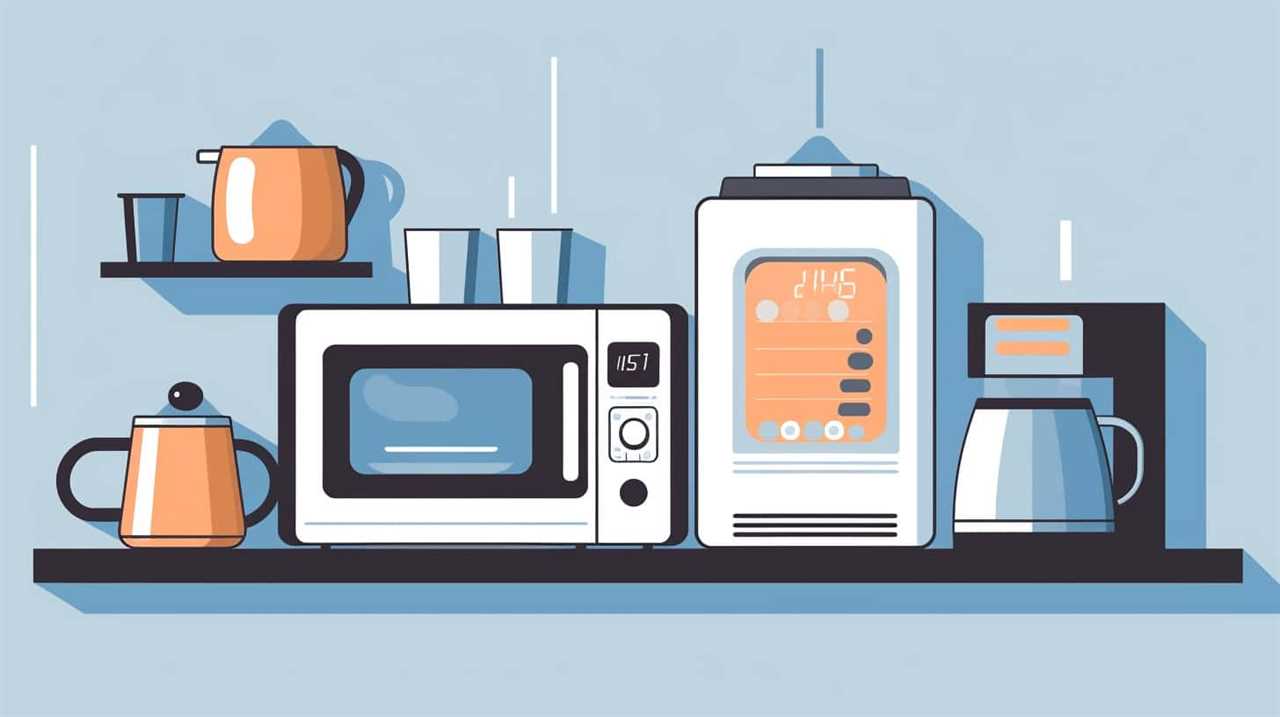
When exploring the great outdoors, it’s important to keep our food and drinks cool and fresh. That’s why many people rely on solar-powered camping fridges. With a wide variety of options available, how do we determine the best choice?
Fear not, fellow adventurers, for we have compiled 12 tips to help you master the art of selecting the perfect solar-powered camping fridge.
From energy efficiency to cooling performance, battery life to solar charging efficiency, we will guide you through the crucial factors to consider.
We will also delve into size and weight, price and value for money, noise level, and additional features.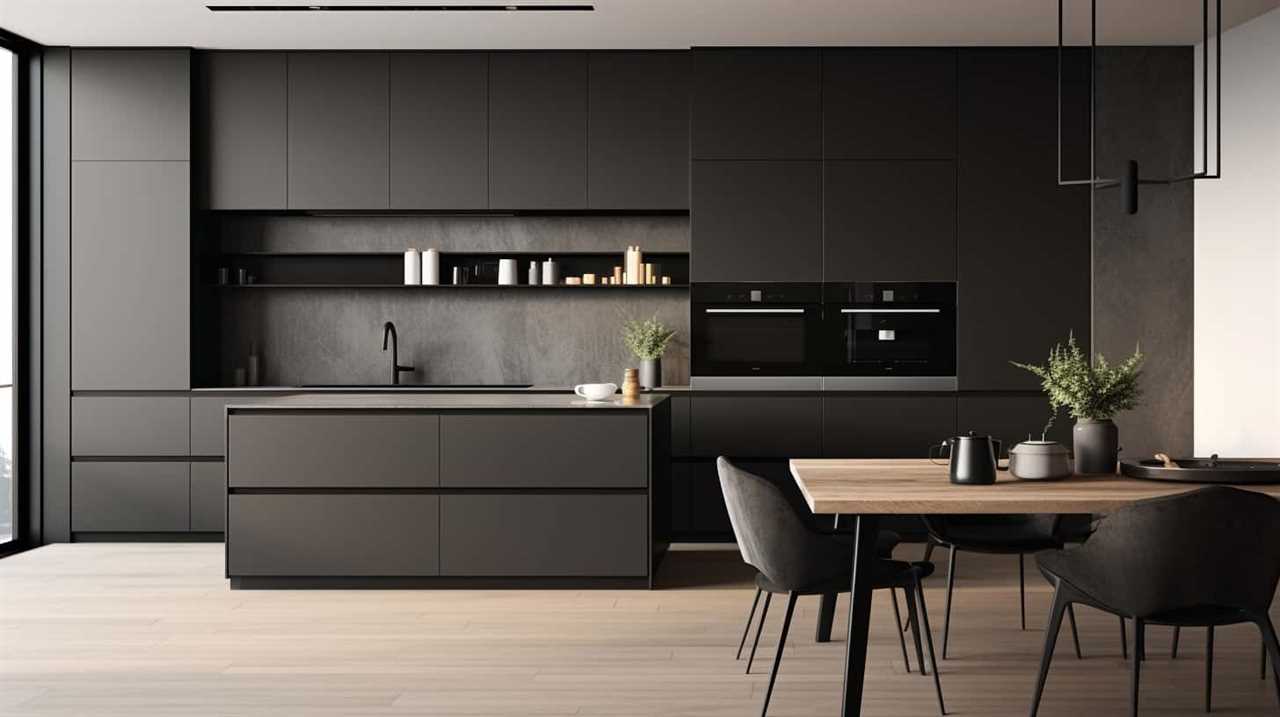
So, let’s embark on this journey together and uncover the secrets behind choosing the ultimate solar-powered camping fridge.
Key Takeaways
- Prioritize energy efficiency when selecting solar-powered camping fridges.
- Choose fridges with advanced insulation technology.
- Consider fridges with efficient LED lighting.
- Ensure compatibility between the fridge and solar panels for optimal performance.
Energy Efficiency
When it comes to selecting solar-powered camping fridges, we should prioritize energy efficiency. This is crucial for maximizing the performance of your fridge while minimizing its impact on the environment. To help you make an informed decision, here are some energy-saving tips and eco-friendly options to consider.
Firstly, look for fridges with high energy efficiency ratings. These ratings indicate how effectively the fridge converts solar energy into cooling power. The higher the rating, the more energy-efficient the fridge will be. Additionally, choose fridges with advanced insulation technology, as this helps to reduce energy loss and maintain a consistent temperature inside the fridge.
Another energy-saving tip is to opt for fridges with adjustable temperature settings. This allows you to set the fridge at the optimal temperature for your needs, preventing unnecessary energy consumption. Additionally, consider fridges with efficient LED lighting instead of traditional incandescent bulbs, as LEDs consume less energy and have a longer lifespan.
When it comes to eco-friendly options, consider fridges made from sustainable materials and those that are free from harmful chemicals. Look for certifications such as Energy Star and RoHS compliance, which ensure that the fridge meets strict environmental standards. These certifications not only guarantee energy efficiency but also reduce the appliance’s overall carbon footprint. Choosing the best refrigerator and freezer units with advanced technology, such as adjustable temperature controls and eco-friendly refrigerants, can further enhance sustainability. Additionally, prioritizing brands with a commitment to ethical manufacturing practices ensures a greener choice.
In conclusion, prioritizing energy efficiency is essential when choosing a solar-powered camping fridge. By following these energy-saving tips and opting for eco-friendly options, you can enjoy the convenience of a fridge while minimizing your environmental impact.
Now, let’s move on to the next section about power capacity and how to choose the right size for your camping needs.
Power Capacity
To continue our exploration of solar-powered camping fridges, let’s now delve into the important aspect of power capacity.
When choosing a solar-powered camping fridge, it’s crucial to consider the power output and solar panel compatibility.
The power capacity of a fridge determines how efficiently it can operate on solar power. It’s measured in watt-hours (Wh) and represents the amount of energy the fridge can consume over a specific period of time. The higher the power capacity of the fridge, the longer it can run on solar power without needing to be recharged.
When evaluating power capacity, it’s essential to consider the power output of the solar panels you plan to use. The fridge and solar panels must be compatible to ensure optimal performance. It’s recommended to choose a fridge with a power capacity that matches or exceeds the power output of your solar panels. This will ensure that your fridge can be powered effectively and efficiently in outdoor settings.
Now that we’ve explored the importance of power capacity, let’s move on to the next crucial aspect to consider when choosing a solar-powered camping fridge: size and weight.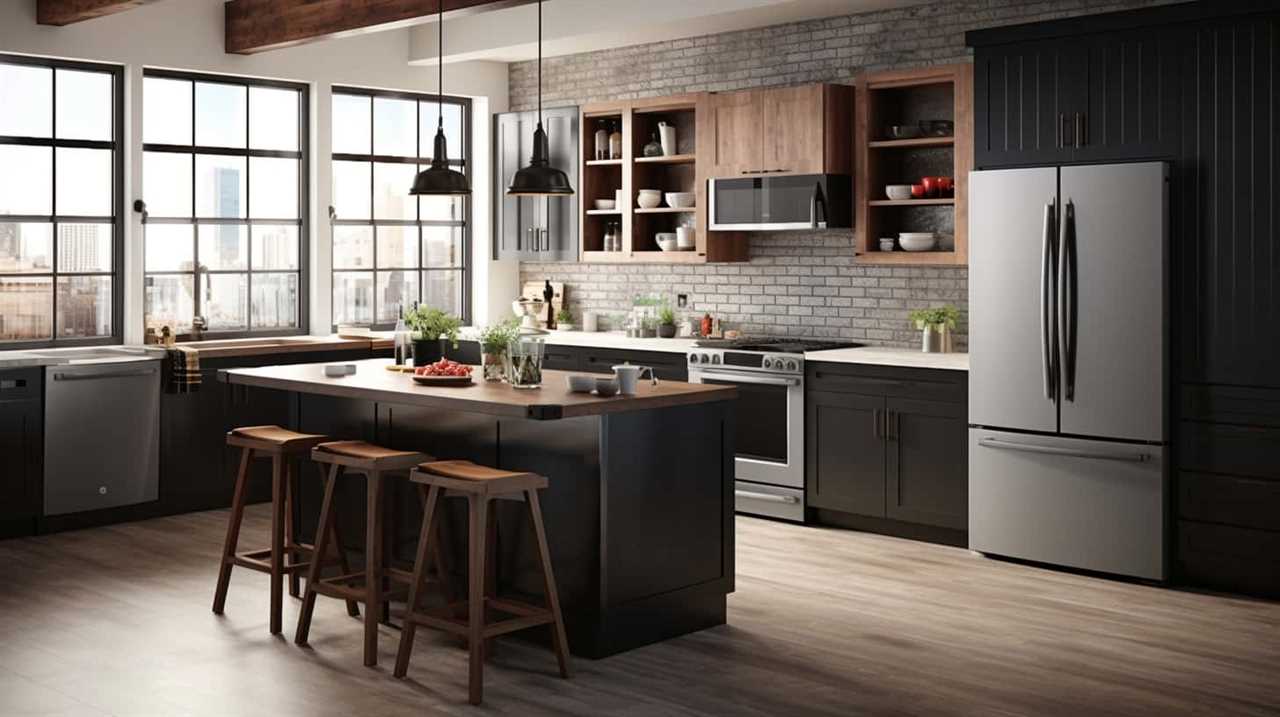
Size and Weight
We need to consider the size and weight of the camping fridge when choosing a solar-powered option. The portability of the fridge is crucial for outdoor activities, so it should be compact and lightweight.
Here are three reasons why size and weight matter when selecting a solar-powered camping fridge:
- Easy transportation: A portable camping fridge should be easy to carry and transport. It should fit comfortably in your vehicle without taking up too much space. Look for fridges that are designed to be lightweight, making them easy to move around and carry on camping trips.
- Convenient storage: The size of the fridge determines its storage capacity. Consider how much food and beverages you need to store during your camping trips. Opt for a fridge with ample storage space that can accommodate your needs. Keep in mind that larger fridges might be heavier and more challenging to transport.
- Energy efficiency: Smaller fridges tend to be more energy-efficient, which is essential when relying on solar power. They require less energy to cool down and maintain the desired temperature, making them ideal for camping trips where power sources may be limited.
Cooling Performance
When choosing a solar-powered camping fridge, it’s crucial to consider the cooling performance. Two key aspects to look at are the energy efficiency ratings and the temperature control options.
Energy efficiency ratings indicate how well the fridge can maintain low temperatures while using minimal power.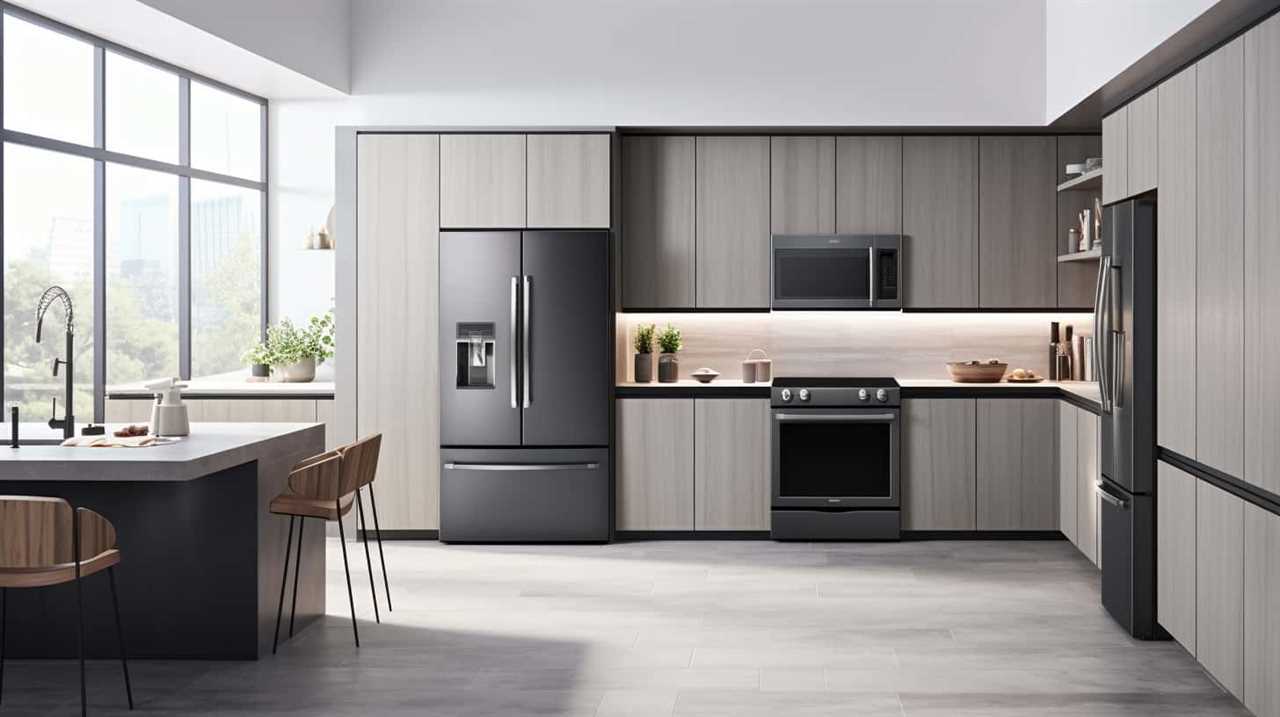
Temperature control options allow you to adjust the cooling settings based on your specific needs.
Energy Efficiency Ratings
Our camping fridge’s energy efficiency ratings greatly impact its cooling performance. When choosing a solar-powered camping fridge, it’s important to consider its energy consumption and eco-friendly options. Here are some key points to keep in mind:
- Energy consumption: Look for fridges with high energy efficiency ratings, as they’ll consume less power and help prolong your battery life during camping trips.
- Eco-friendly options: Consider fridges that use environmentally friendly refrigerants and materials, such as those free from CFCs and HCFCs, to reduce their impact on the environment.
- Solar compatibility: Ensure that the fridge is designed to work efficiently with solar power systems, allowing you to harness the sun’s energy and minimize your reliance on other power sources.
By selecting a camping fridge with excellent energy efficiency ratings and eco-friendly features, you can enjoy optimal cooling performance while minimizing your environmental footprint.
Now, let’s move on to discussing temperature control options.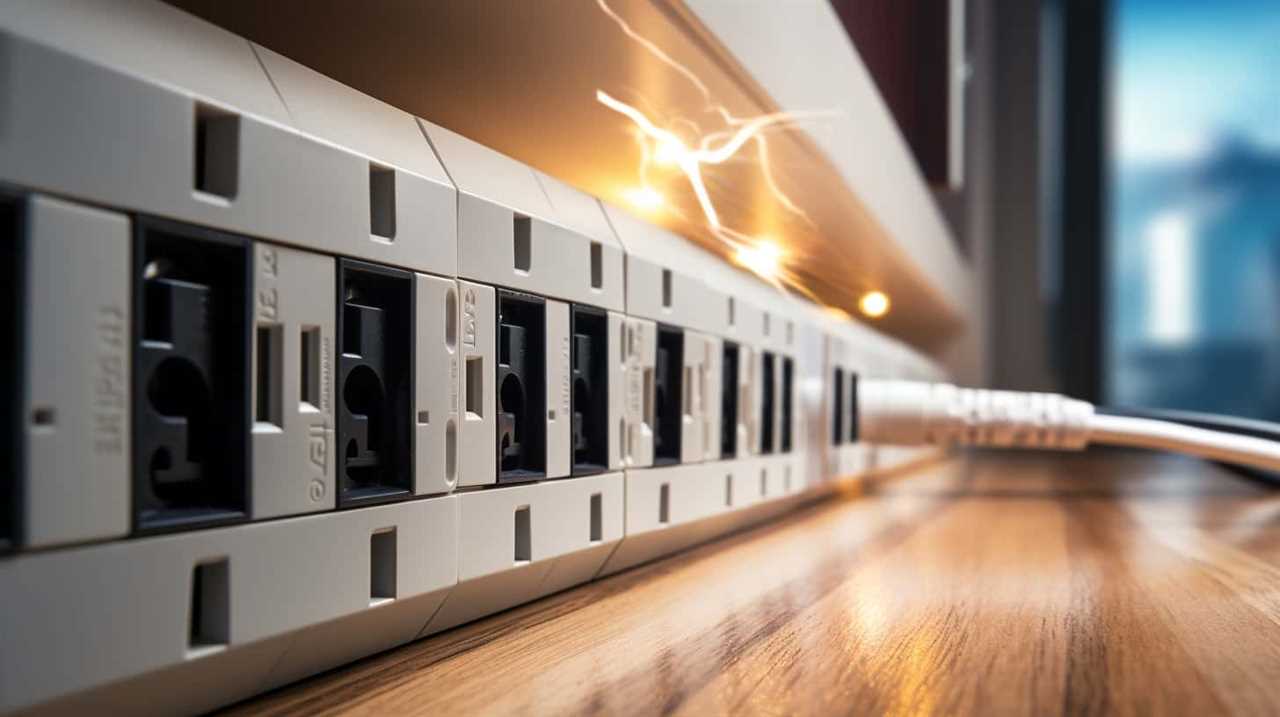
Temperature Control Options
To ensure optimal cooling performance, it’s essential to consider the temperature control options when selecting a solar-powered camping fridge.
One important aspect to look for is the thermostat technology used in the fridge. A high-quality solar-powered camping fridge will have a precise and efficient thermostat that allows you to set and maintain the desired temperature inside. This ensures that your food and beverages stay fresh and cool without freezing.
Additionally, a good thermostat will also help minimize power consumption by regulating the fridge’s compressor cycles based on the temperature settings. This means that the fridge will only work as much as necessary, reducing energy waste and prolonging the lifespan of your solar power system.
Battery Life
When it comes to solar-powered camping fridges, battery life is a crucial factor to consider. To optimize battery efficiency, it’s important to choose a fridge that has a power management system in place, allowing it to adjust energy consumption based on cooling needs.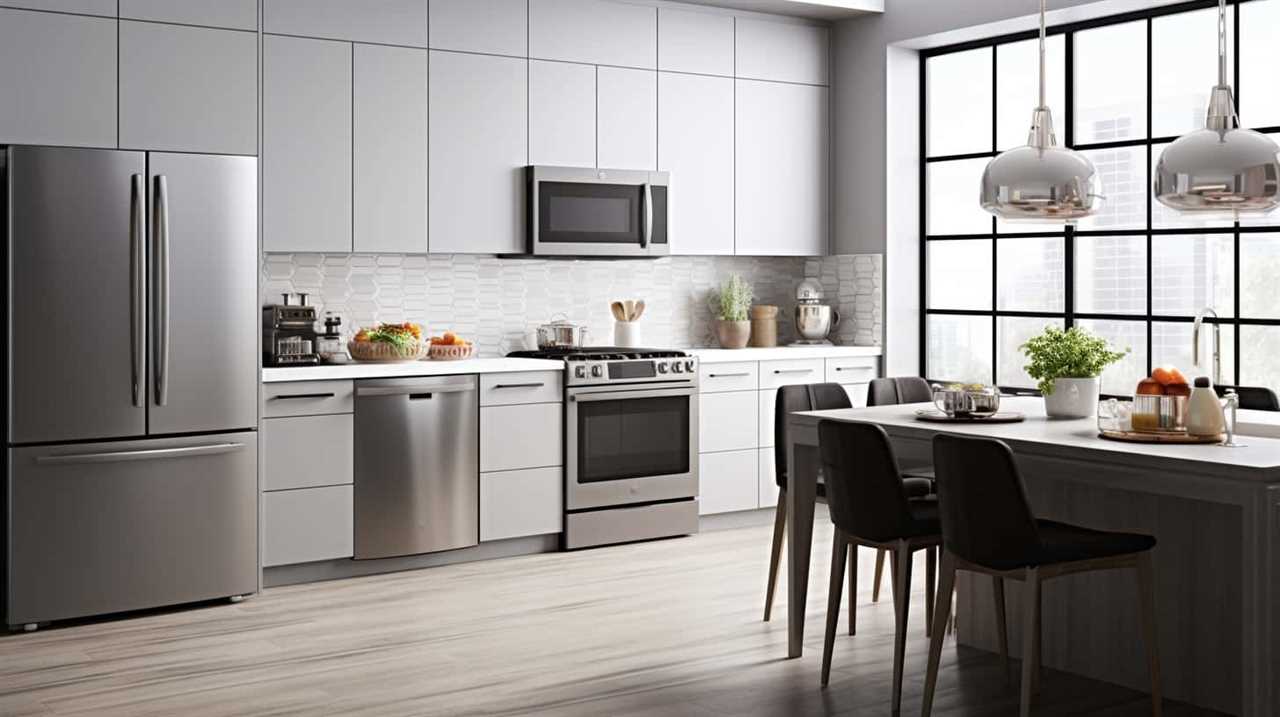
Additionally, selecting a fridge with a long-lasting power storage capacity ensures that it can operate for extended periods without requiring recharging.
Optimizing Battery Efficiency
One key factor in optimizing battery efficiency for solar-powered camping fridges is maximizing the use of available energy. To achieve this, it’s important to consider certain aspects such as battery maintenance and solar panel compatibility.
Here are some practical tips to help you optimize your battery efficiency:
- Regular Battery Maintenance: Regularly check and clean the battery terminals to ensure proper contact and reduce energy loss. Additionally, keep an eye on the battery’s water levels and top up as needed to prevent damage.
- Efficient Solar Panel Compatibility: Ensure that your solar panel is compatible with your camping fridge’s battery. This will ensure that the panel can efficiently charge the battery and maximize energy conversion.
- Optimal Charging Conditions: Place your solar panel in a location that receives maximum sunlight exposure throughout the day. Additionally, angle the panel towards the sun to optimize solar absorption and improve charging efficiency.
Long-Lasting Power Storage
We recommend using a high-capacity battery to ensure long-lasting power storage for your solar-powered camping fridge. The longevity of charge is crucial when you’re out in the wilderness with limited access to electricity. A high-capacity battery will provide you with a longer operating time, allowing you to keep your food and beverages cold for extended periods.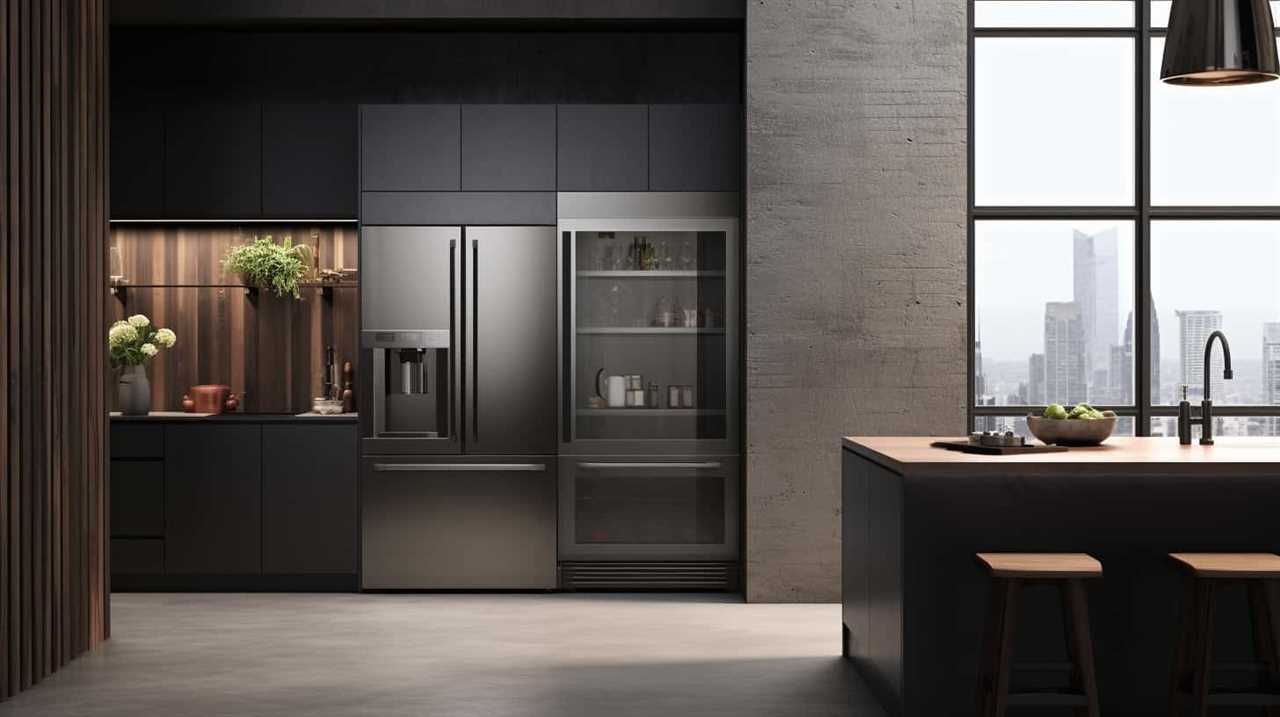
When choosing a battery, consider its compatibility with solar panels. Ensure that the battery you select is compatible with the solar panel system you plan to use. This will ensure efficient charging and optimal performance of your camping fridge.
Durability and Build Quality
For our solar-powered camping fridges, the durability and build quality are essential factors to consider. When it comes to choosing a fridge that can withstand the rigors of outdoor adventures, durability testing and construction materials are paramount. Here are three key points to keep in mind:
- Durability Testing: Look for fridges that have undergone rigorous durability testing. This ensures that they can withstand vibrations, bumps, and shocks that are common during camping trips. Look for certifications such as IPX ratings, which indicate the degree of protection against water and dust ingress.
- Construction Materials: The materials used in the construction of the fridge play a significant role in its durability. Opt for fridges made from high-quality materials such as stainless steel or rugged plastic. These materials aren’t only sturdy but also resistant to corrosion and impact.
- Reinforced Hinges and Latches: The hinges and latches of the fridge need to be robust and secure to withstand constant opening and closing. Look for fridges that feature reinforced hinges and latches, as they’re less likely to break or loosen over time.
Temperature Control
When choosing a solar-powered camping fridge, it’s important to consider its temperature control capabilities. Three key points to keep in mind are energy efficiency ratings, thermostat accuracy, and cooling capacity.
Energy efficiency ratings determine how much power the fridge consumes, while thermostat accuracy ensures precise temperature control. Cooling capacity determines how quickly and effectively the fridge can cool down your food and beverages.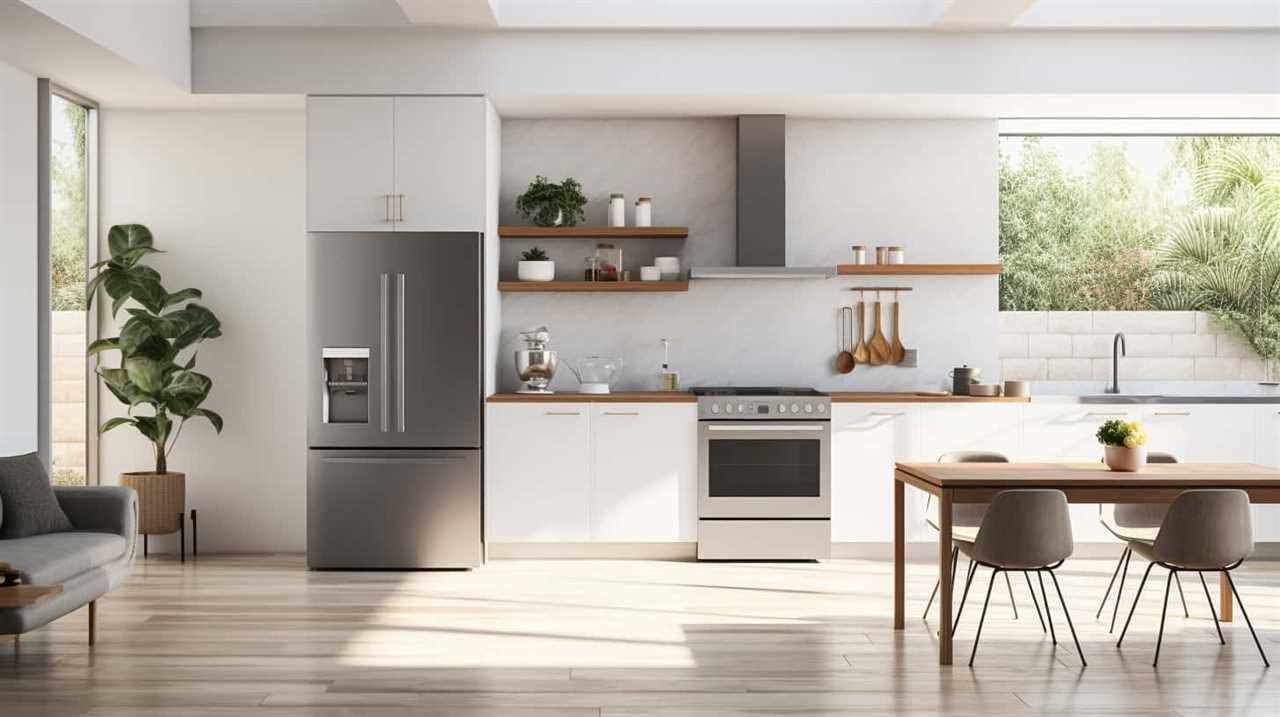
Considering these points will help you select a camping fridge that meets your temperature control needs during your outdoor adventures.
Energy Efficiency Ratings
To ensure optimal energy efficiency in solar-powered camping fridges, it’s crucial to consider the temperature control’s energy efficiency ratings. When choosing a fridge, here are some key factors to keep in mind:
- Energy saving features: Look for fridges that have advanced insulation and seals to minimize heat transfer and reduce energy consumption.
- Sustainability benefits: Consider fridges that use eco-friendly refrigerants and materials, such as those with low global warming potential (GWP) and zero ozone depletion potential (ODP).
- Temperature control accuracy: Opt for fridges with precise temperature control settings to ensure your food stays at the right temperature without unnecessary energy wastage.
Thermostat Accuracy Importance
Our top priority when selecting a solar-powered camping fridge is the thermostat accuracy. It’s crucial to have a fridge that can accurately maintain the desired temperature, especially when storing perishable items. To ensure precise temperature control, it’s important to consider the thermostat calibration of the fridge.
A well-calibrated thermostat will accurately read and maintain the chosen temperature, preventing any fluctuations that could compromise the freshness and safety of your food. Additionally, the temperature range that the fridge can achieve is essential. Look for a fridge that offers a wide temperature range, allowing you to adjust it according to your specific needs.

By prioritizing thermostat accuracy and considering the temperature range, you can ensure that your solar-powered camping fridge will effectively meet your cooling requirements.
Now, let’s move on to the next section and discuss cooling capacity considerations.
Cooling Capacity Considerations
One important consideration for choosing a solar-powered camping fridge is the fridge’s cooling capacity. When it comes to keeping your food and beverages cool and fresh during your camping adventures, you want a fridge that can handle the task efficiently and effectively.
Here are some key factors to consider when evaluating the cooling capacity of a solar-powered camping fridge: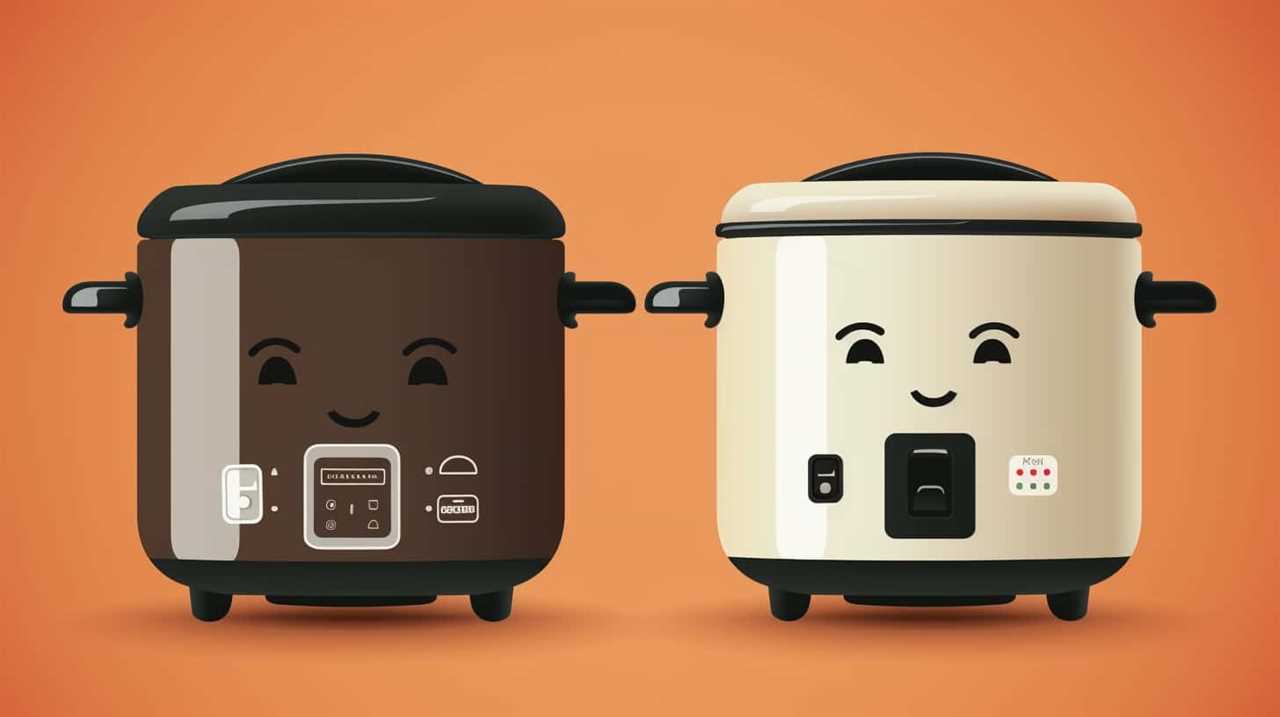
- Cooling performance comparison: Look for fridges that have a high cooling capacity and can maintain low temperatures even in hot outdoor conditions. Compare the cooling performance of different models to ensure you choose one that meets your needs.
- Environmental impact considerations: Opt for fridges that are energy-efficient and have eco-friendly features. Look for models that use low-power compressors and have insulation that minimizes heat transfer, reducing the environmental impact of your camping fridge.
Considering the cooling capacity and environmental impact of a solar-powered camping fridge is crucial for ensuring you have a reliable and sustainable cooling solution during your outdoor adventures.
Now, let’s move on to the next important aspect to consider – portability and mobility.
Portability and Mobility
When considering the portability and mobility of solar-powered camping fridges, it’s important to prioritize ease of transportation and maneuverability. These fridges are designed to be taken on outdoor adventures, so having features that make them easy to carry and move around is crucial.
One key aspect to look for is portability features such as sturdy handles and durable wheels. This allows you to easily transport the fridge from your vehicle to your campsite without straining your back or having to make multiple trips. Additionally, consider the weight of the fridge itself. Opt for lightweight models that won’t add unnecessary bulk to your camping gear.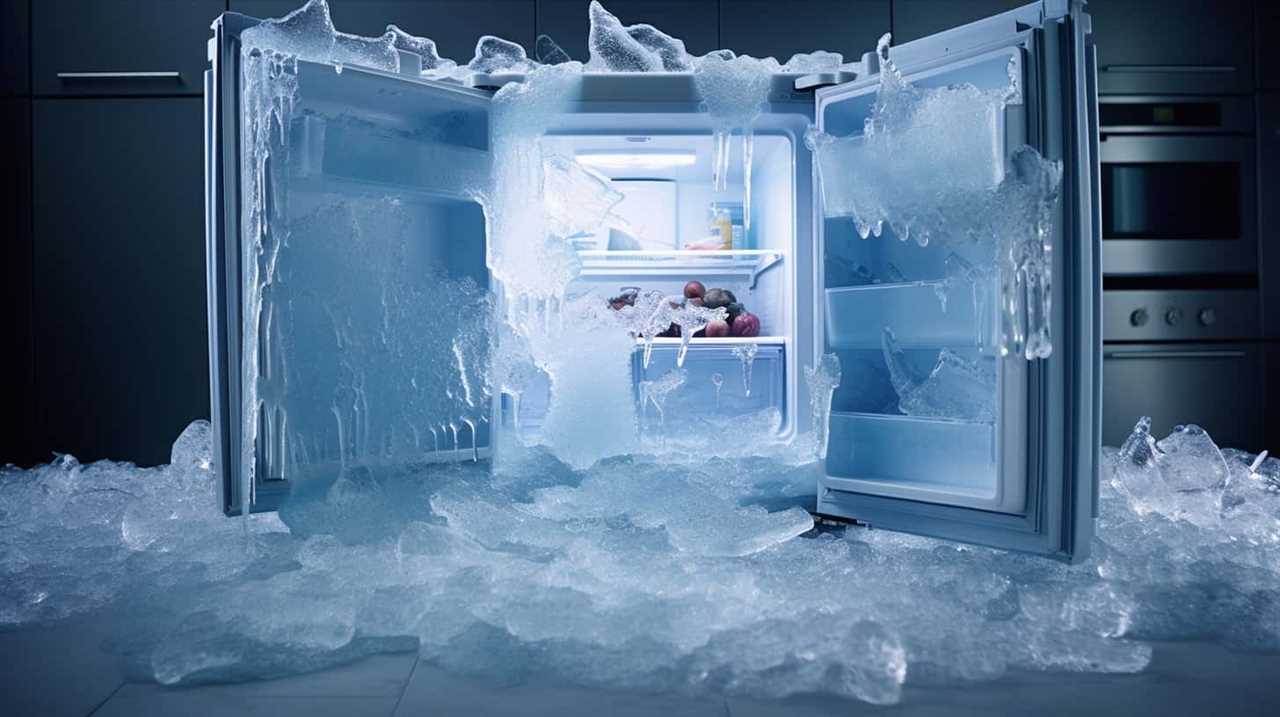
Another important consideration is solar panel compatibility. Since the purpose of a solar-powered camping fridge is to operate off-grid, it’s essential to ensure that the fridge is compatible with solar panels. Look for fridges that have built-in charge controllers and are compatible with various solar panel configurations. This will allow you to harness the power of the sun to keep your food and beverages cool without relying on traditional power sources.
Solar Charging Efficiency
Let’s assess the solar charging efficiency of solar-powered camping fridges. When it comes to choosing the right fridge for your outdoor adventures, the solar charging efficiency is a crucial factor to consider. Here are some key points to keep in mind:
- Solar Panel Maintenance: Regular maintenance of the solar panels is essential to ensure optimal charging efficiency. Keep the panels clean and free from debris, as any dirt or obstructions can significantly reduce their ability to harness solar energy.
- Power Output Optimization: To maximize the charging efficiency, it’s important to position the solar panels in direct sunlight. Avoid placing them in shaded areas or obstructing them with objects that can cast shadows. Additionally, using high-quality solar panels with a higher power output can help you charge your camping fridge more efficiently.
By following these guidelines, you can ensure that your solar-powered camping fridge operates at its highest charging efficiency.
Now that we’ve discussed the solar charging efficiency, let’s move on to the next section, where we’ll delve into the important aspect of ‘price and value for money’.
Price and Value for Money
To assess the value for money of solar-powered camping fridges, we need to consider the price in relation to the features and durability they offer. When it comes to solar powered camping fridges, there are options available for every budget. If you’re looking for a budget-friendly option, there are several models that provide excellent value for money. These fridges may not have all the bells and whistles of their more expensive counterparts, but they still offer reliable cooling performance and durability.
When comparing prices, it’s important to consider the features that are essential for your camping needs. Some fridges may have additional features like built-in solar panels or dual-zone compartments, which can increase the price. However, if these features aren’t necessary for your camping trips, you can save money by opting for a simpler model.
Durability is also a key factor to consider when evaluating the value for money of solar-powered camping fridges. Look for fridges that are made with high-quality materials and have a sturdy construction to ensure they can withstand the rigors of outdoor use.
In conclusion, when choosing a solar-powered camping fridge, it’s important to find the right balance between price and the features and durability that are essential for your camping needs. By considering these factors, you can find a budget-friendly option that offers great value for money.
Now, let’s move on to discussing the next important factor to consider when choosing a solar-powered camping fridge: the noise level.
Noise Level
As we consider the next important factor in choosing a solar-powered camping fridge, it’s important to address the noise level. When you’re out in the wilderness, the last thing you want is a noisy fridge disturbing the tranquility of your surroundings.
Here are some key points to keep in mind when it comes to the noise level of a solar-powered camping fridge:
- Silent operation: Look for fridges that are specifically designed to operate quietly. These models are equipped with noise reduction technology, ensuring that you can enjoy a peaceful camping experience without any unnecessary disturbances.
- Power consumption: It’s important to find a balance between a quiet fridge and efficient power consumption. While some fridges may operate silently, they might consume more power, which can be a concern when you’re relying solely on solar energy. Look for fridges that offer a good balance between noise level and power efficiency.
- User reviews: Don’t just rely on the manufacturer’s claims about noise level. Check user reviews to get real-life feedback from people who’ve already used the fridge. This will give you a more accurate idea of how silent the fridge actually is.
Considering the noise level is essential when choosing a solar-powered camping fridge. Now that we’ve covered this factor, let’s move on to discussing some additional features to look for in your ideal camping fridge.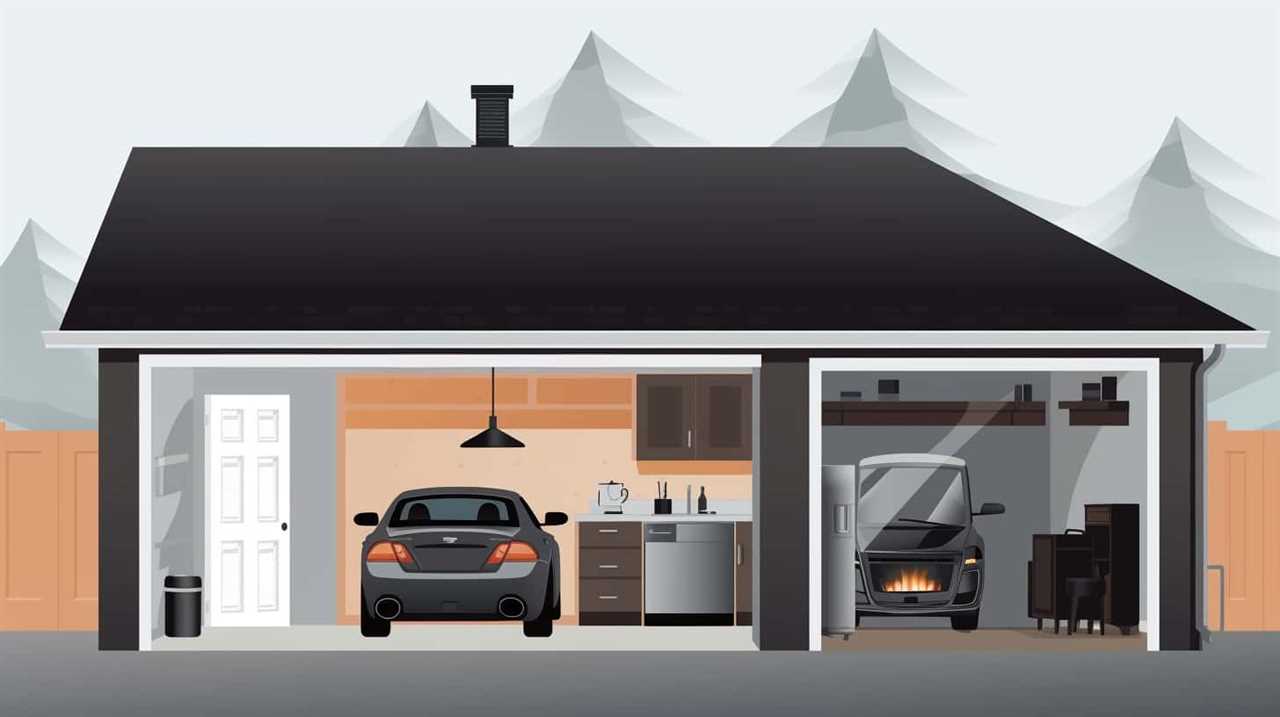
Additional Features
Continuing our exploration of choosing a solar-powered camping fridge, we should now delve into the additional features that can enhance your camping experience.
When it comes to a camping fridge, having precise temperature control is essential. Look for a fridge with advanced thermostat features that allow you to set and maintain the desired temperature accurately. This feature ensures that your food and drinks stay fresh and cool, even in hot weather.
Another important aspect to consider is insulation technology. The insulation of a camping fridge plays a crucial role in its overall performance. Look for fridges that feature high-quality insulation materials, such as thick foam or vacuum panels. These technologies help to minimize heat transfer, keeping the inside of the fridge cool for longer periods. Additionally, good insulation ensures that your fridge operates efficiently, reducing the load on the solar panels and prolonging battery life.
Some camping fridges also come with extra features that can enhance your camping experience. These may include built-in LED lights, USB ports for charging devices, or even Bluetooth connectivity for convenient control through a smartphone app. While these features may not be essential, they can certainly add convenience and functionality to your camping setup.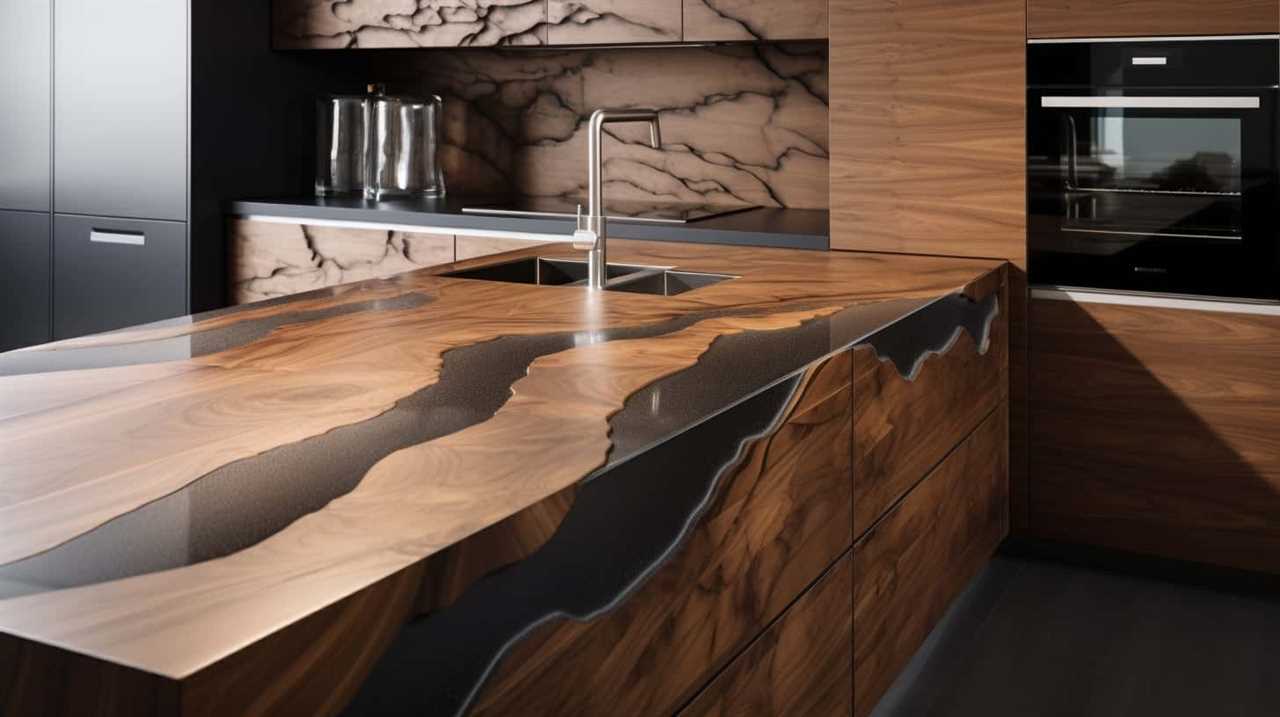
Frequently Asked Questions
Can I Use a Solar-Powered Camping Fridge in Extreme Temperatures?
In extreme temperatures, using a solar-powered camping fridge can be challenging. However, there are tips for maximizing its efficiency.
Firstly, ensure proper insulation by using a fridge with thick walls and a well-sealed door.
Additionally, position the fridge in a shaded area to minimize exposure to direct sunlight.
Lastly, consider using a portable solar panel with a higher wattage to generate more power.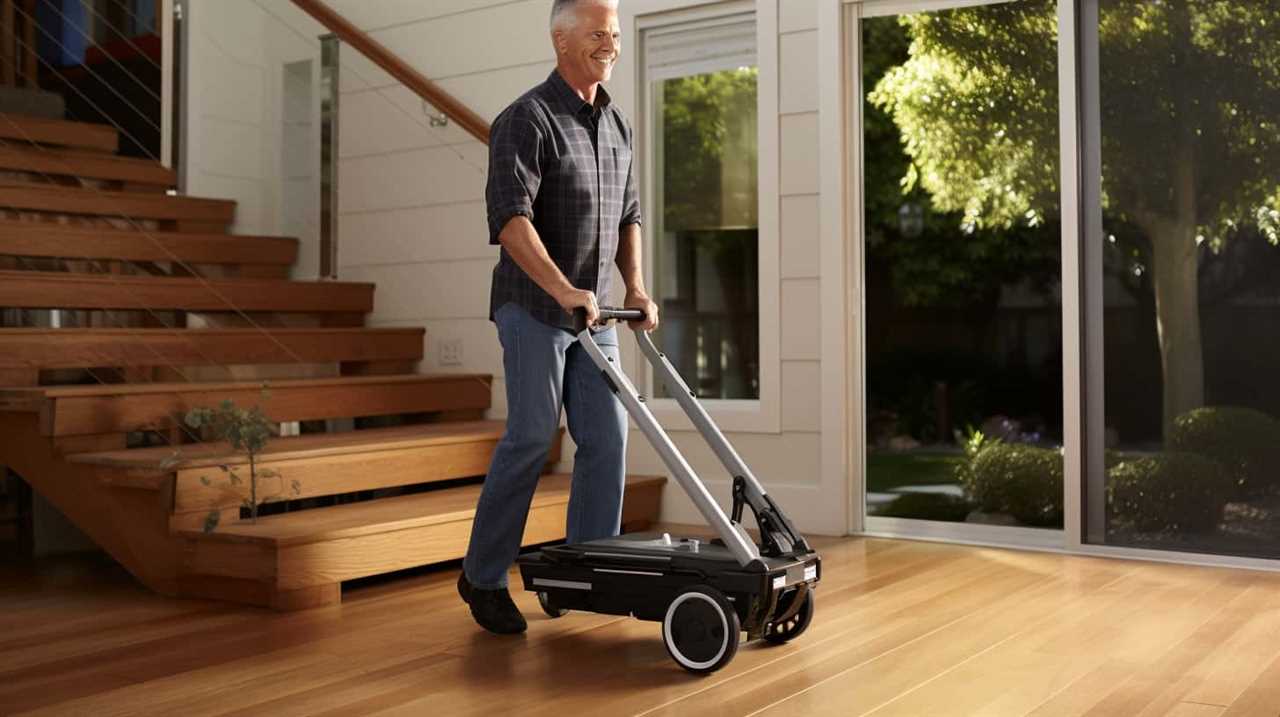
How Long Does It Take for a Solar-Powered Camping Fridge to Cool Down After Being Turned On?
When it comes to the cooling efficiency of a solar-powered camping fridge, there are a few tips that can help maximize its performance.
Firstly, make sure to place the fridge in a shaded area to avoid direct sunlight. Additionally, keeping the fridge well-insulated and minimizing the opening of the door will help maintain cool temperatures.
Lastly, troubleshooting common issues such as checking the solar panel connections and ensuring proper ventilation can ensure optimal cooling.
Can I Use a Solar-Powered Camping Fridge While Driving in My Rv?
Yes, you can use a solar-powered camping fridge while driving in your RV. Solar-powered camping fridges are designed to work on the go, allowing you to keep your food and drinks cool during your travels.
However, it’s important to consider the pros and cons of using a solar-powered camping fridge in different weather conditions. While solar power is a great renewable energy source, it may be less efficient in cloudy or rainy weather.
Nonetheless, solar-powered camping fridges provide a practical and eco-friendly solution for keeping your food fresh while on the road.
Are Solar-Powered Camping Fridges Suitable for Long Camping Trips?
When considering solar-powered camping fridges for long camping trips, there are both pros and cons to keep in mind.
On the positive side, these fridges provide a reliable and eco-friendly way to keep your food and drinks cool without relying on traditional power sources.
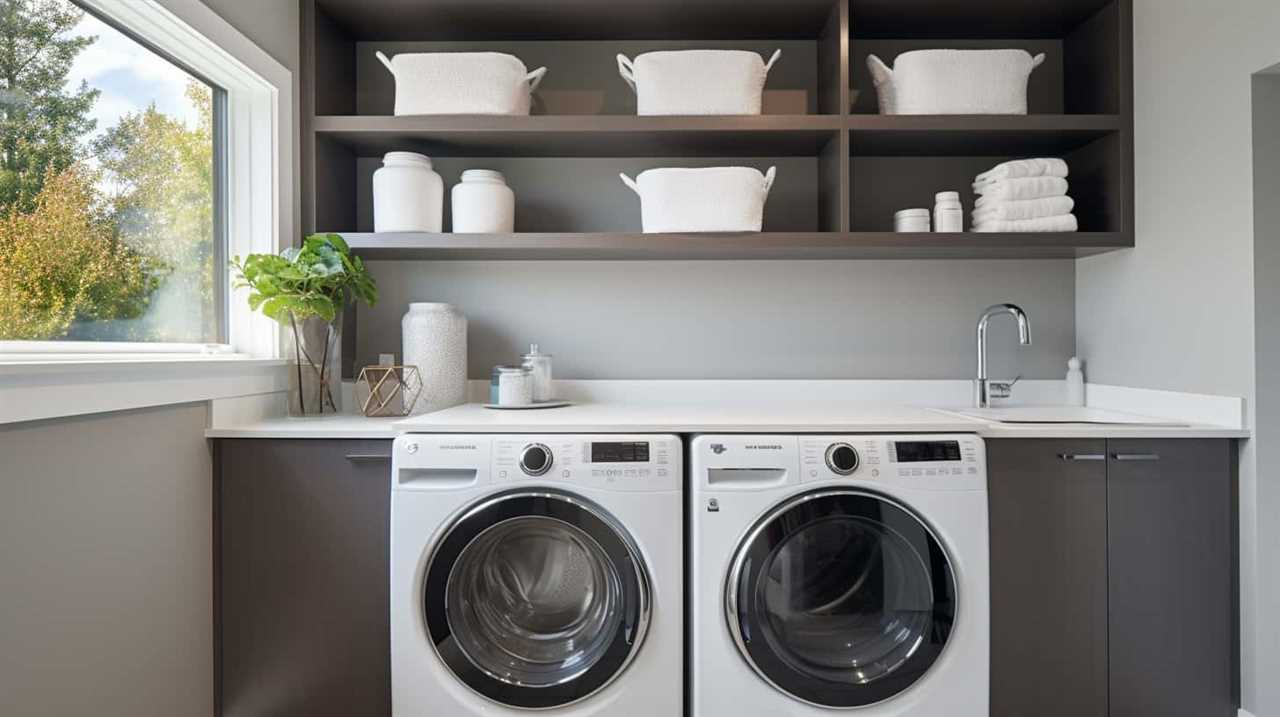
However, it’s important to properly maintain and care for your fridge during extended trips. Regularly cleaning the solar panels and checking the battery levels will ensure optimal performance.
Can I Connect Multiple Solar Panels to Increase the Charging Efficiency of My Camping Fridge?
Yes, connecting multiple solar panels can significantly improve the charging efficiency of your camping fridge. By increasing the amount of solar energy harvested, you can ensure a more reliable and consistent power supply.
However, it’s essential to consider the compatibility of your fridge and the solar panels, as well as the wiring configuration.
Additionally, exploring alternative power sources, such as portable power stations or generators, can provide backup options in case of insufficient sunlight.
Conclusion
In conclusion, when it comes to choosing a solar-powered camping fridge, it’s important to consider factors such as:
- Energy efficiency: Look for a fridge that has a high energy efficiency rating, as this will help conserve power and extend battery life.
- Power capacity: Consider the amount of food and drinks you plan to bring on your camping trip and choose a fridge with sufficient power capacity to accommodate your needs.
- Size and weight: Opt for a fridge that is compact and lightweight, making it easier to transport and fit into your camping setup.
- Cooling performance: Ensure that the fridge has a reliable cooling system that can maintain a consistent temperature, keeping your food and drinks fresh.
- Battery life: Look for a fridge with a long-lasting battery life, so you won’t have to worry about running out of power during your camping trip.
- Solar charging efficiency: Consider the efficiency of the fridge’s solar charging capabilities, as this will determine how quickly and effectively it can recharge its battery using solar energy.
- Price: Set a budget and choose a fridge that offers the best value for your money, taking into account its features and durability.
- Noise level: If you prefer a quiet camping experience, look for a fridge that operates silently to avoid any disturbances.
- Additional features: Consider any extra features that may enhance your camping experience, such as a built-in freezer compartment or a digital temperature control.
While these tips may seem overwhelming, remember that investing in a high-quality fridge will ensure your camping experience is cool and refreshing. So, don’t let your outdoor adventures turn into a hot mess – choose wisely and chill out!
- About the Author
- Latest Posts
Introducing Charles, the Editor in Chief at ByRetreat, whose passion for interior design and editorial excellence elevates every remote workspace to new heights. With his keen eye for detail, impeccable taste, and expertise in design, Charles brings a wealth of knowledge and creativity to the ByRetreat team.
As the Editor in Chief of a renowned lifestyle blog, Charles has honed his skills in curating captivating content and staying up-to-date with the latest trends in interior design. His deep understanding of aesthetics and the power of storytelling through design enables him to create remote workspaces that are not only visually stunning but also rich in personality and meaning.
Garage Door Opener
Top 5 Garage Door Opener Remotes for Motorcycles
Need a reliable garage door opener remote for your motorcycle? Discover the top 5 remotes that offer convenience and security for your daily routines.
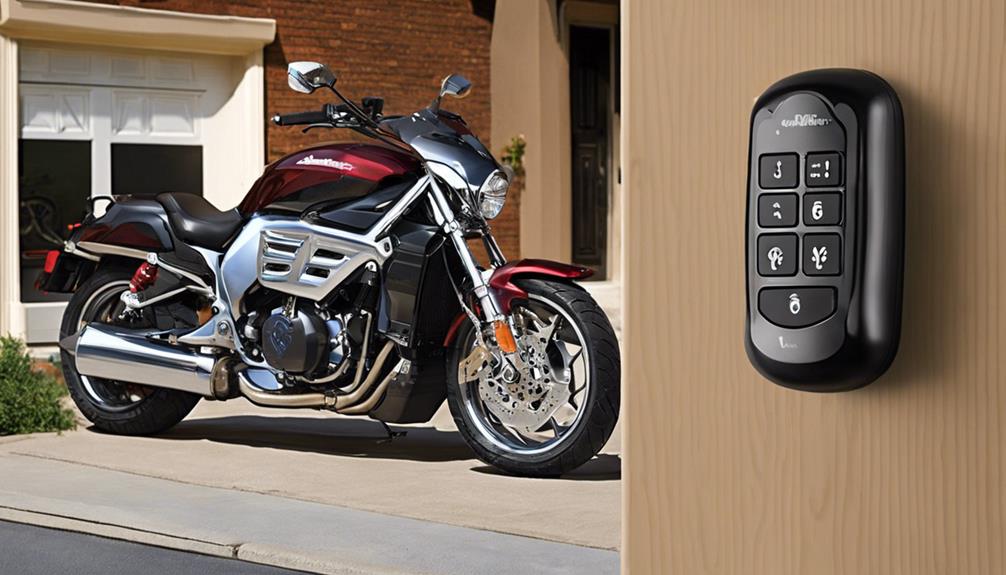
Interested in finding out which garage door opener remotes are great for motorcycles?
The top 5 remotes we've identified offer a range of features that cater to different needs and preferences.
From compact designs to long-range capabilities, these remotes provide convenience and security for motorcycle owners.
Stay tuned to discover how these remotes can enhance your garage access experience and make your daily routines more streamlined and efficient.
Key Takeaways
- Compact design for easy handlebar attachment and operation
- Long-range capability up to 100 feet for convenient garage access
- Weatherproof construction ensures durability in harsh conditions
- Universal compatibility with various motorcycle and garage opener brands
Compact Remote Options
When selecting compact remote options for motorcycles, it's crucial to consider the compatibility with a range of garage door opener brands to ensure seamless integration. These motorcycle garage door opener remotes are designed to work effortlessly with popular brands like Harley Davidson, Ducati, Honda, Kawasaki, and Yamaha R3. The easy programming feature utilizing multi-code technology allows for quick synchronization with various garage door openers, making the setup process a breeze.
These compact remote options come in different package variations, including standard black, chrome, and braided cable assemblies, catering to different aesthetic preferences. The Canadian patented design ensures a simple operation with just a press of a button, providing a convenient experience for motorcyclists. The positive customer reviews and a remarkable 5.0 rating attest to the high satisfaction levels and the endorsement of the product's functionality in real-world scenarios.
When it comes to compact remote options for motorcycle garage door openers, easy programming and seamless compatibility are the key features that guarantee a liberating and hassle-free experience.
Long Range Performance
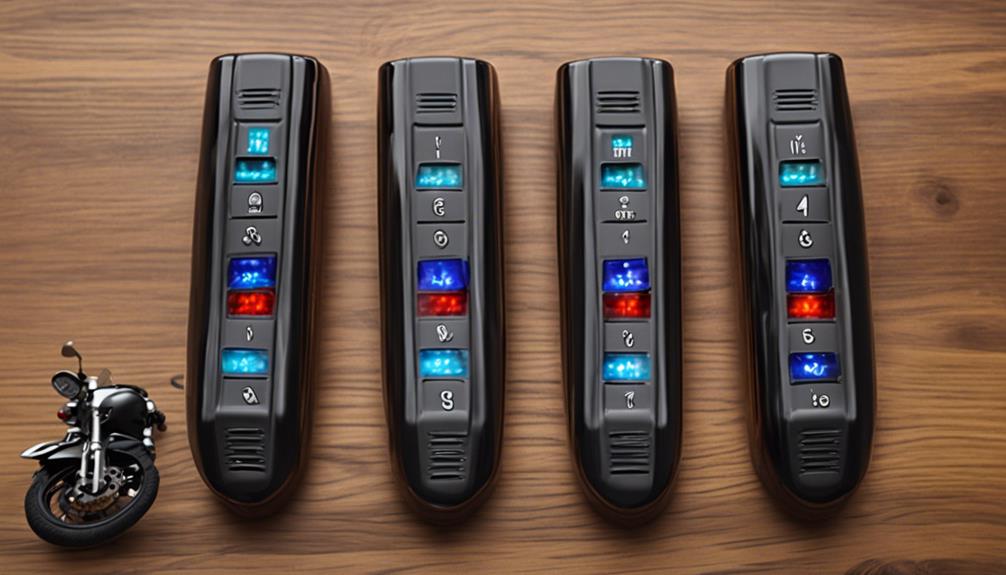
With a focus on enhancing convenience and accessibility, remote options like the Riders Magic Touch offer impressive long-range performance capabilities of up to 100 feet for seamless garage access. These garage door remotes are designed to work efficiently with motorcycles, ensuring that you can easily open your garage door from a distance without any hassle. Here are some key features to consider for optimal long-range performance:
- Compatible with various garage door opener brands for versatile use.
- Enhanced signal strength and range for reliable operation even from afar.
- Allows quick and easy access to the garage without needing to dismount the motorcycle.
- Works reliably to provide seamless garage access every time.
- Easy to install and set up for immediate use.
When looking for a garage door remote that excels in long-range performance, options like the Riders Magic Touch and Kustom Cycle Parts Universal Opener Remote are excellent choices for motorcyclists seeking liberation and convenience.
Weatherproof Designs
Incorporating weatherproof designs into garage door opener remotes ensures their resilience against environmental factors, guaranteeing prolonged functionality in outdoor settings. These remotes are specifically crafted to withstand the harshest conditions, making them ideal for garages, doors, and other outdoor applications.
With materials chosen to resist wear and tear from rain, sun exposure, and other weather elements, these weatherproof remotes provide reliable operation regardless of the outdoor environment. Constructed from high-quality components, they maintain peak performance even in extreme conditions, offering peace of mind to users who rely on them for accessing their garages or doors.
Whether mounted on motorcycles, golf carts, or other outdoor vehicles exposed to the elements, these weatherproof garage door opener remotes deliver the durability and longevity necessary for seamless functionality in any weather. For those seeking a dependable solution for outdoor access control, weatherproof designs ensure consistent performance and longevity in challenging environments.
Easy Mounting Solutions
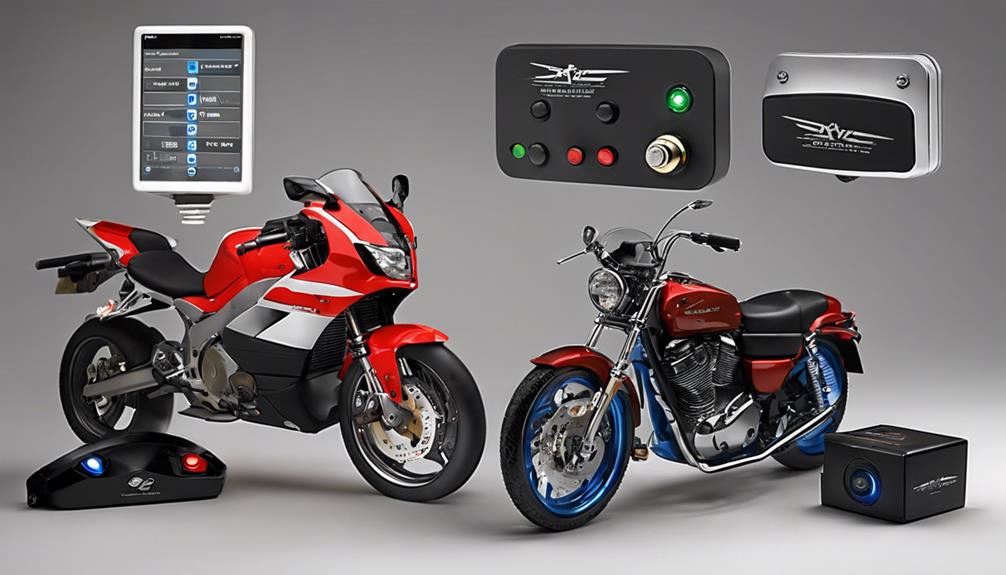
To ensure effortless installation and accessibility, motorcycle garage door opener remotes offer easy mounting solutions designed for quick attachment to handlebars. These remotes come with mounting hardware that simplifies the process, making it convenient for riders to access their garage doors.
Here are five key points about the easy mounting solutions for motorcycle garage door opener remotes:
- Mounting hardware included for quick and hassle-free attachment.
- Designed to fit most motorcycle handlebars for easy access.
- Customizable mounting options available to suit individual preferences.
- Secure attachment ensures the remote stays in place during rides.
- Easy installation process allows users to start using the garage door opener without delays.
Universal Compatibility
For seamless integration with a wide range of motorcycles and garage door opener brands, the universal compatibility of these motorcycle garage door opener remotes ensures convenient access for riders. These door opener remotes are designed to work with popular motorcycle brands like Harley Davidson, Ducati, Honda, Kawasaki, and Yamaha R3, providing riders with a versatile solution for their garage door access needs. Additionally, they're compatible with a variety of garage door opener brands such as Chamberlain, Genie, Linear, Stanley, and Wayne Dalton, offering flexibility and convenience.
The programming process is straightforward, allowing users to easily sync the remote with their garage door openers. With the inclusion of features like the Learn Button function, these remotes can adapt to different existing switch styles, ensuring a seamless connection. This compatibility ensures that riders can enjoy a hassle-free experience when accessing their garages, making these remotes a practical and efficient solution for motorcycle enthusiasts seeking liberation and convenience in their daily routines.
Frequently Asked Questions
What Brand of Garage Door Opener Is the Most Reliable?
When it comes to reliability, Chamberlain stands out as a top choice among garage door opener brands. Its reputation for durability and consistent performance makes it a favorite among motorcycle owners.
With Chamberlain, you can trust that your garage door opener will function smoothly and reliably, providing peace of mind for your motorcycle security needs.
What Is the Highest Horsepower Garage Door Opener?
We know the highest horsepower garage door opener on the market is 1.25 HP. This robust motor efficiently operates heavy garage doors in commercial or residential settings. Its high horsepower rating allows it to effortlessly lift and lower large, heavy doors.
Compared to lower horsepower models, this opener offers superior performance and durability. Whether for a business or home, this powerful motor ensures smooth garage door operation.
Who Makes Aviator Garage Openers?
We've got the answer you've been waiting for! Aviator Garage Openers, those top-notch products, are crafted by the esteemed manufacturer Aviator Garage.
Their cutting-edge features like rolling code technology offer elevated security and ease of use. Compatible with various garage security systems, these openers are durable and reliable, perfect for motorcycle owners seeking peace of mind.
Aviator Garage ensures quality, longevity, and resistance to wear and tear.
How Do I Know Which Garage Door Remote to Buy?
When choosing a garage door remote, we prioritize compatibility with your motorcycle brand and the opener brand. Look for customization options like package combinations and easy programming features for convenience.
To make the best choice, read customer reviews to verify functionality, reliability, and user satisfaction. Ensure the remote has multi-code options and simple button press programming.
Conclusion
In conclusion, the top 5 garage door opener remotes for motorcycles offer a range of features to enhance convenience and security.
One interesting statistic to note is that these remotes have a long-lasting battery life of up to 5 years, providing reliable performance over an extended period.
With easy installation, universal compatibility, and durable construction, these remotes are a practical choice for motorcycle owners looking to streamline their garage access experience.
- About the Author
- Latest Posts
Introducing Ron, the home decor aficionado at ByRetreat, whose passion for creating beautiful and inviting spaces is at the heart of his work. With his deep knowledge of home decor and his innate sense of style, Ron brings a wealth of expertise and a keen eye for detail to the ByRetreat team.
Ron’s love for home decor goes beyond aesthetics; he understands that our surroundings play a significant role in our overall well-being and productivity. With this in mind, Ron is dedicated to transforming remote workspaces into havens of comfort, functionality, and beauty.
-

 Decor2 weeks ago
Decor2 weeks agoMaximalist Decor Explained: Embrace More Style
-

 Vetted3 weeks ago
Vetted3 weeks ago15 Best Foot Massagers for Neuropathy to Soothe Your Feet and Relieve Discomfort
-
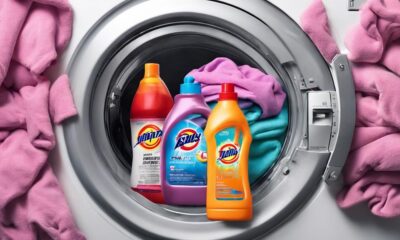
 Vetted3 weeks ago
Vetted3 weeks ago15 Best Sports Laundry Detergents for Keeping Your Activewear Fresh and Clean
-
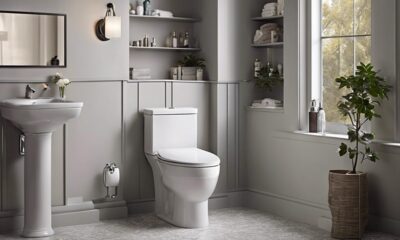
 Vetted4 weeks ago
Vetted4 weeks ago15 Best Tall Toilets for Seniors That Combine Comfort and Safety
-

 Vetted4 weeks ago
Vetted4 weeks ago15 Best Dish Scrubbers to Keep Your Kitchen Sparkling Clean
-
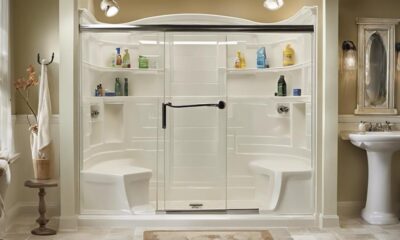
 Vetted5 days ago
Vetted5 days ago15 Best Cleaners for Fiberglass Showers to Keep Your Bathroom Sparkling Clean
-

 Decor4 weeks ago
Decor4 weeks agoWhat Is Eclectic Home Decor
-

 Vetted1 week ago
Vetted1 week ago15 Best Organic Pest Control Solutions for a Naturally Pest-Free Home





